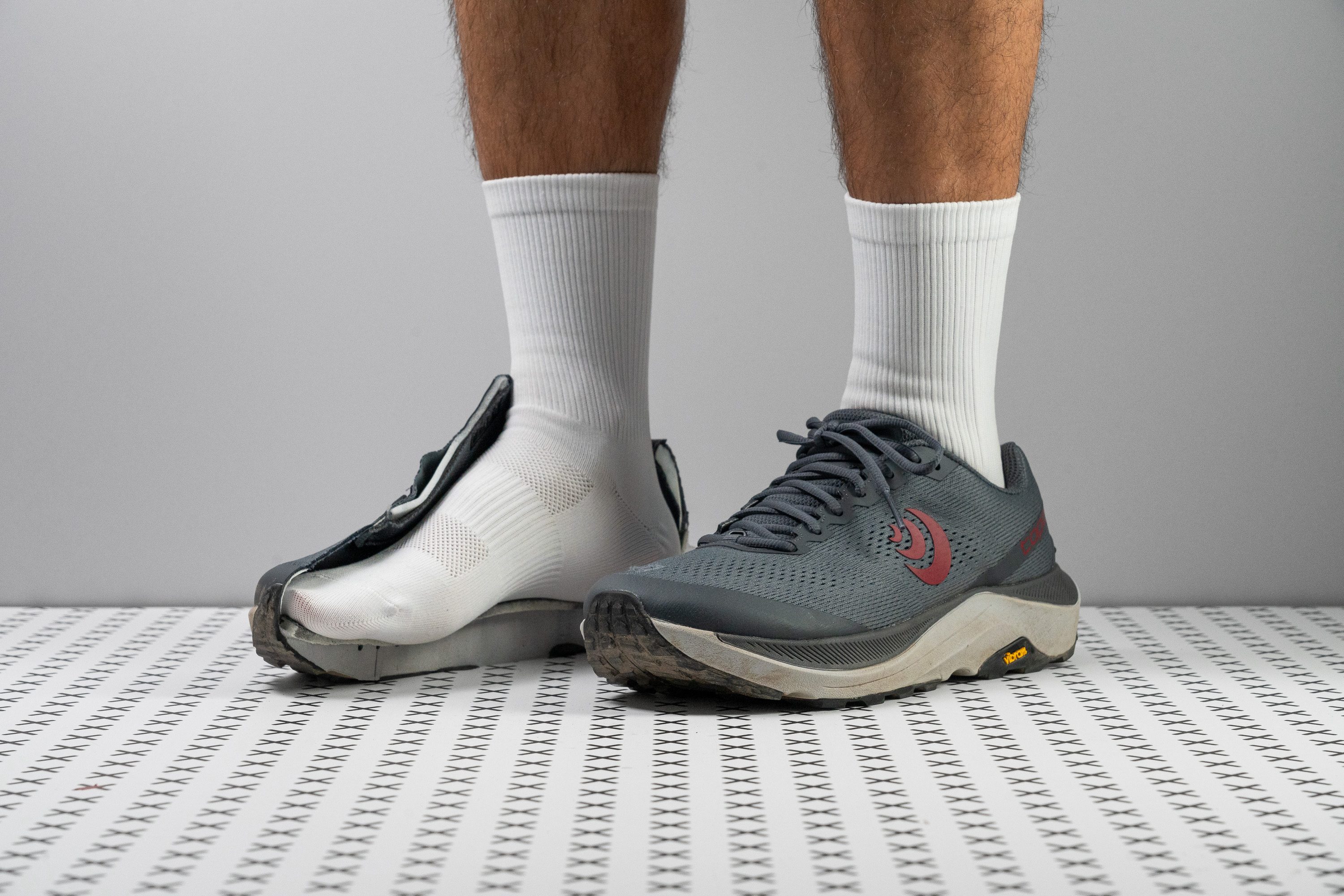Our verdict
Pros
- Ultra-roomy toe box
- Protective underfoot
- Works for hiking too
- Excellent traction by Vibram
- Great midfoot and heel hold
- Versatile for trails and roads
- Above-average durability
- Lightweight for its size
- Solid Altra Olympus alternative
Cons
- Not the best for heel strikers
- Only for easy or mild trails
- Needs better outsole coverage
- Lacks reflective elements
Audience verdict
- Top 30% in ultra running shoes
- Top 30% in running shoes for hiking
- Top 28% most popular running shoes
Comparison
The most similar running shoes compared
+ + Add a shoe | |||||
|---|---|---|---|---|---|
| Audience score | 88 Great! | 84 Good! | 85 Good! | 90 Superb! | |
| Price | $150 | $155 | $150 | $150 | |
| Trail terrain | Light | Light | Light | Light | |
| Shock absorption | High | High | Moderate | - | |
| Energy return | Low | Moderate | Low | - | |
| Arch support | Neutral | Neutral | Neutral | Neutral | |
| Weight lab Weight brand | 9.7 oz / 276g 10.2 oz / 289g | 10.9 oz / 309g 10.5 oz / 297g | 10.1 oz / 286g 10.1 oz / 285g | 9.7 oz / 275g 10.8 oz / 307g | |
| Drop lab Drop brand | 6.3 mm 5.0 mm | 4.2 mm 4.0 mm | 6.6 mm 5.0 mm | 11.6 mm 6.0 mm | |
| Strike pattern | Mid/forefoot | Mid/forefoot | Mid/forefoot | Heel | |
| Size | True to size | Half size small | True to size | Slightly small | |
| Midsole softness | Soft | Soft | Soft | Balanced | |
| Difference in midsole softness in cold | Small | Small | Small | Normal | |
| Toebox durability | Decent | Good | Bad | Good | |
| Heel padding durability | Decent | Good | Decent | Good | |
| Outsole durability | Good | Good | Good | Good | |
| Breathability | Moderate | Moderate | Moderate | Warm | |
| Width / fit | Wide | Medium | Wide | Medium | |
| Toebox width | Wide | Medium | Wide | Medium | |
| Stiffness | Moderate | Stiff | Moderate | Moderate | |
| Torsional rigidity | Stiff | Stiff | Moderate | Stiff | |
| Heel counter stiffness | Moderate | Moderate | Flexible | Stiff | |
| Lug depth | 3.2 mm | 3.3 mm | 3.2 mm | 3.3 mm | |
| Heel stack lab Heel stack brand | 37.2 mm 35.0 mm | 37.3 mm 33.0 mm | 35.1 mm 35.0 mm | 35.8 mm 30.0 mm | |
| Forefoot lab Forefoot brand | 30.9 mm 30.0 mm | 33.1 mm 29.0 mm | 28.5 mm 30.0 mm | 24.2 mm 24.0 mm | |
| Widths available | Normal | NormalWideX-Wide | NormalWide | Normal | |
| Season | All seasons | All seasons | All seasons | All seasons | |
| Removable insole | ✓ | ✓ | ✓ | ✓ | |
| Orthotic friendly | ✓ | ✓ | ✓ | ✓ | |
| Ranking | #268 Top 40% | #237 Bottom 38% | #210 Bottom 45% | #46 Top 12% | |
| Popularity | #188 Top 28% | #24 Top 7% | #164 Top 43% | #266 Bottom 30% |
Who should buy
We think the Ultraventure 3 is the ideal trail shoe for:
- Runners who find Altra's zero-drop design too extreme but still want a super-roomy, foot-shaped toebox for the trails.
- Those with wide and high-volume feet that want a cushioned trail shoe—this one offers unmatched space.
- Topo fans who enjoy their road models, as this model retains a similar feel while adding a fantastic Vibram trail-ready outsole.
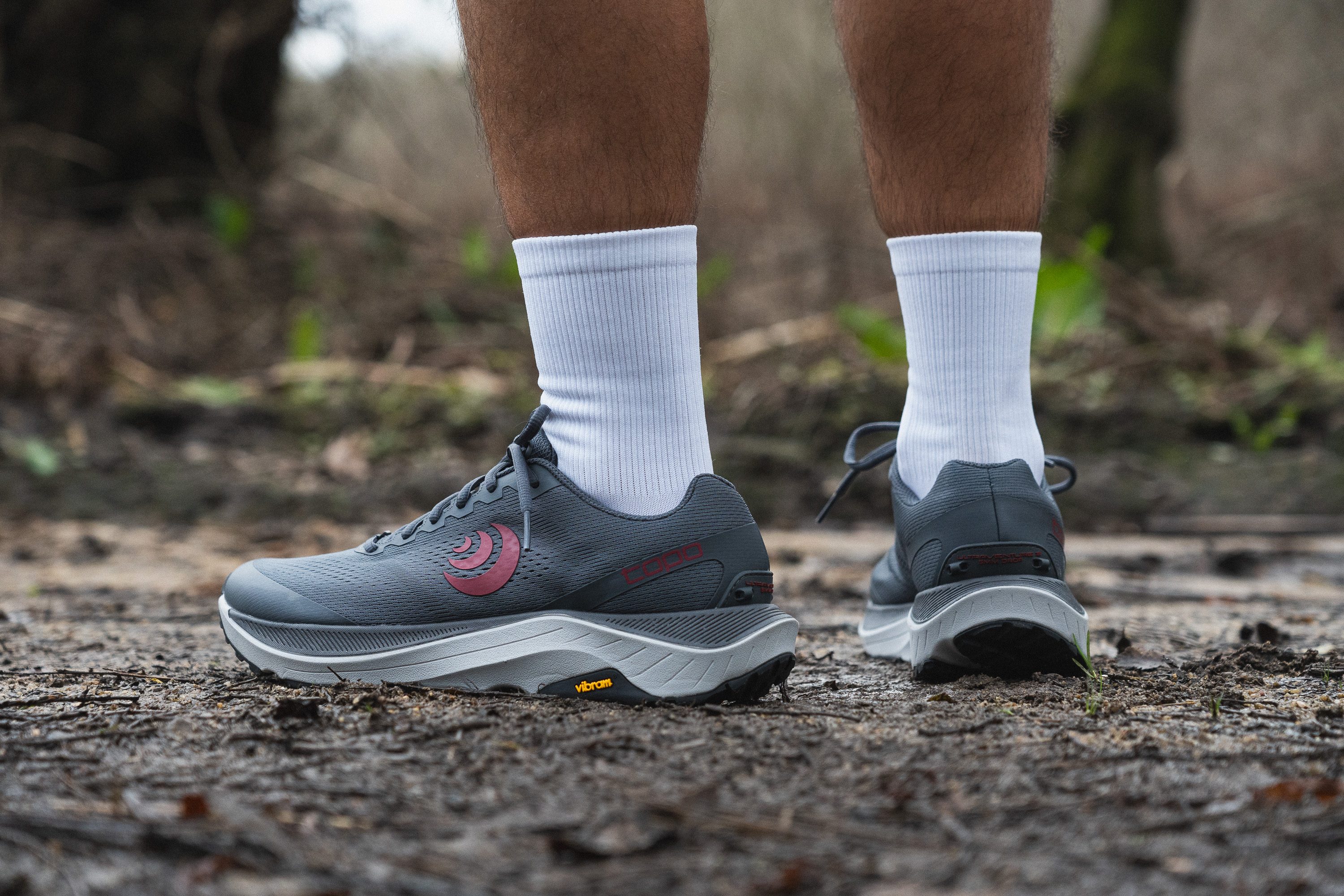
Who should NOT buy
In our view, the Ultraventure 3 isn't the best option for heel strikers. If you tend to land heel-first, we believe the ASICS Trabuco Max 3 is a far superior choice—it offers a more supportive platform and retains a wide toebox.
Additionally, we found that runners with narrow or low-volume feet may struggle with the Ultraventure 3’s excessively spacious fit. Its ultra-roomy forefoot leaves too much empty space for those needing a snugger feel. Instead, we think the Hoka Challenger 7 is a much better alternative—it provides excellent road-to-trail versatility and a sleeker toebox that accommodates a narrower foot shape.
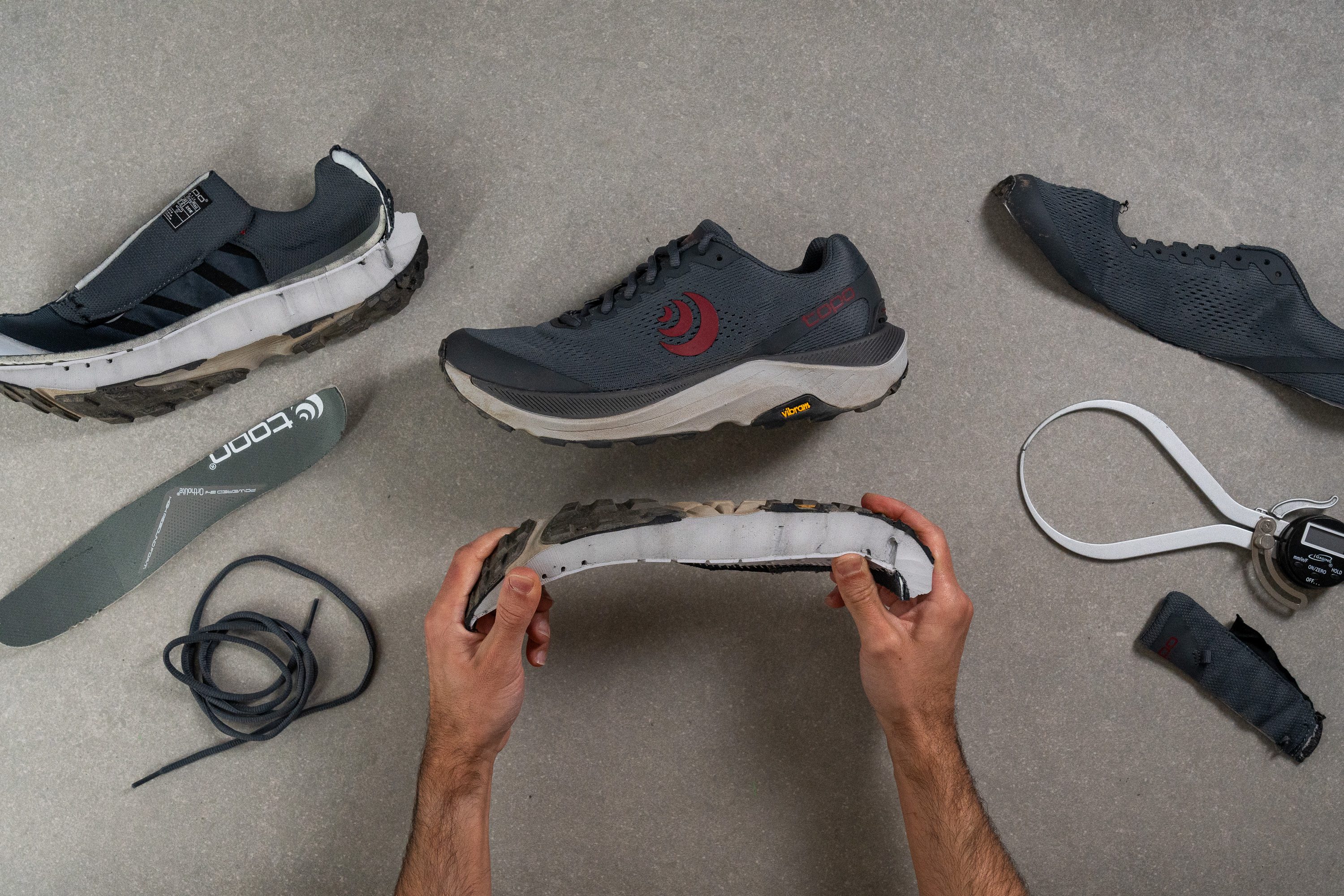
Cushioning
Shock absorption
It seems Topo wanted the name to highlight this shoe’s readiness for ultra-distance adventures—and they nailed it with the midsole. With 134 SA in the heel and 118 SA in the forefoot, it cushions landings effortlessly, no matter your weight or how far you plan to run.
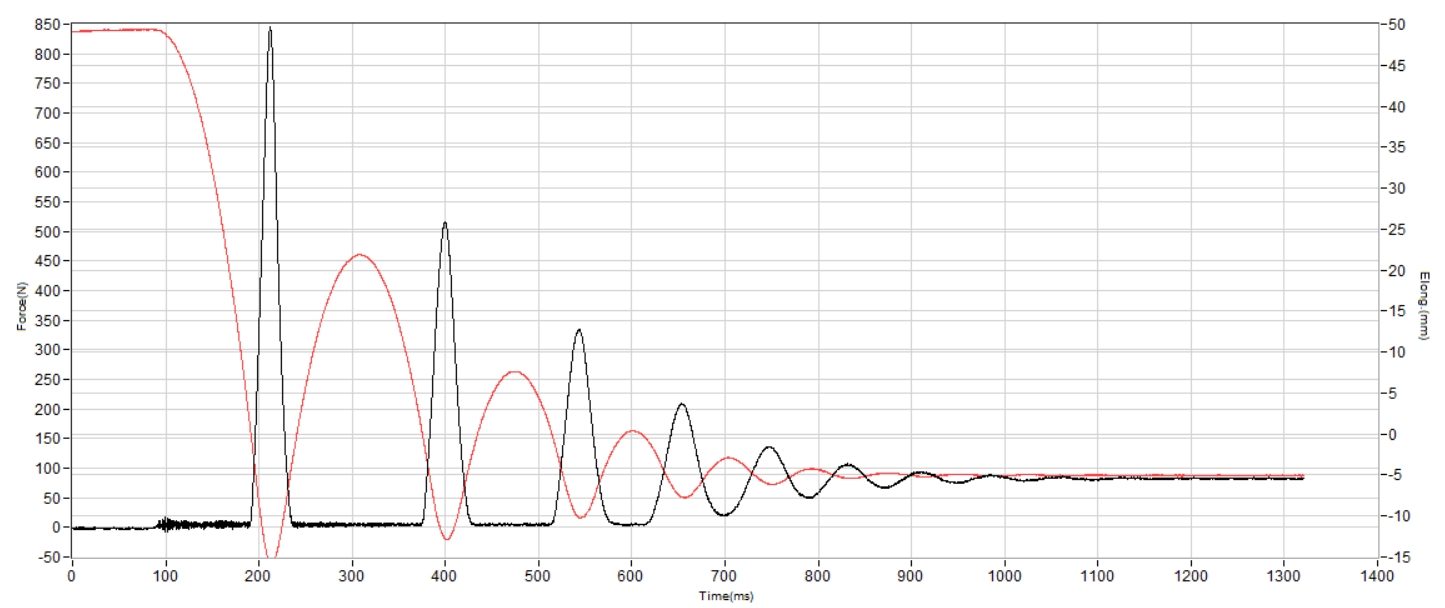
| Topo Ultraventure 3 | 134 SA |
| Average | 122 SA |
Energy return
Energy return tells a different story, with just 50.4% in the heel and 53.3% in the forefoot. The ride feels well cushioned, but flat and lacking in excitement.
| Topo Ultraventure 3 | 50.4% |
| Average | 55.3% |
Heel stack
Few shoes in our lab exceed their advertised stack height, but the Topo Ultraventure 3 defied expectations—measuring 37.2 mm against Topo's claimed 35 mm.
That extra-thick cushioning makes it a solid choice for those seeking highly-protective, shock-absorbing support while hiking or tackling rugged trails. However, remember that more foam doesn’t necessarily mean a softer ride, as firmness depends on the midsole’s formulation.
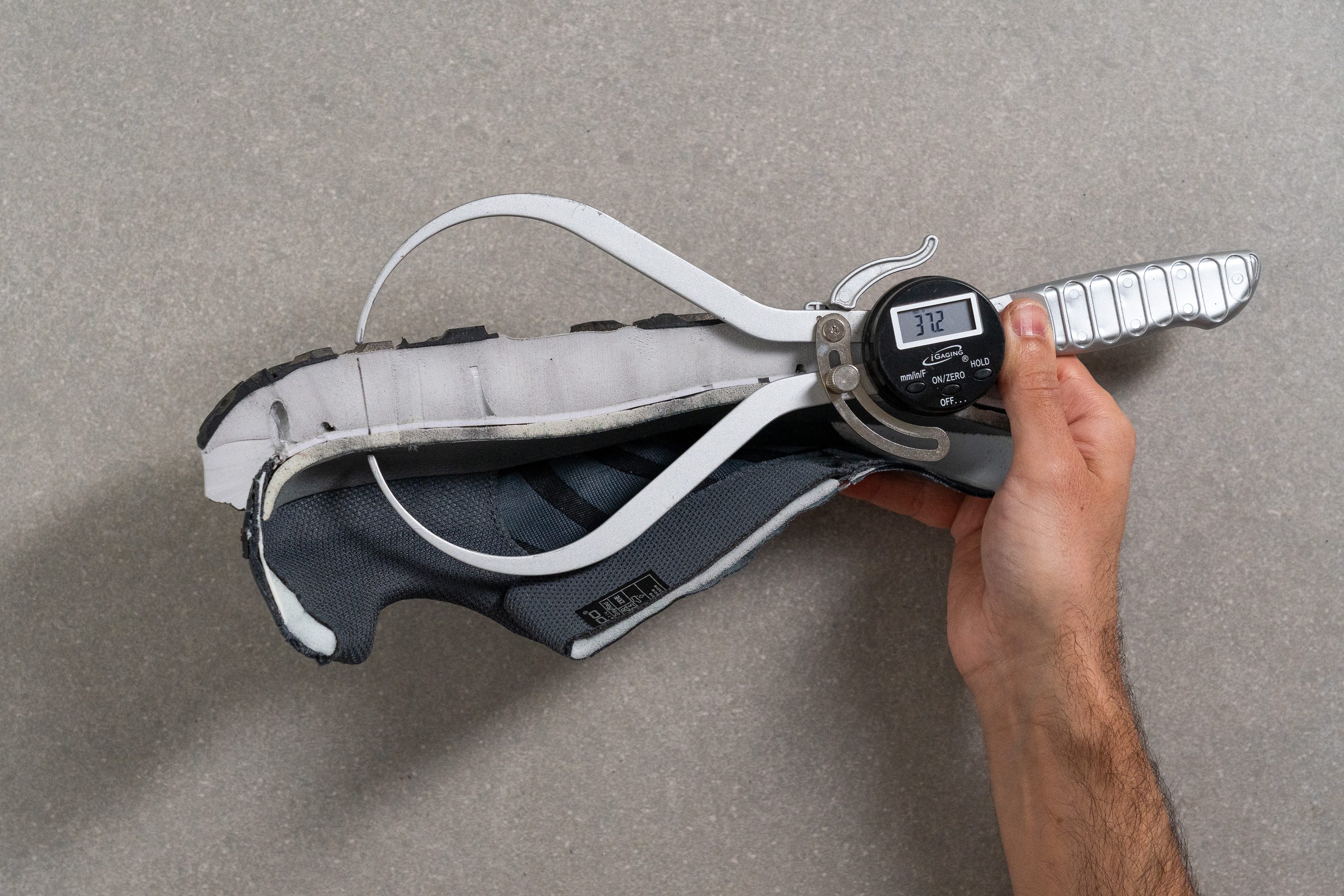
| Topo Ultraventure 3 | 37.2 mm |
| Average | 32.6 mm |
Forefoot stack
The forefoot stack exceeds 30 mm, cementing this as a true maximalist trail shoe.
In our view, Topo Athletic made a smart choice by skipping a rock plate—the foam offers ample protection, and avoiding extra layers keeps the ride lightweight and flexible.
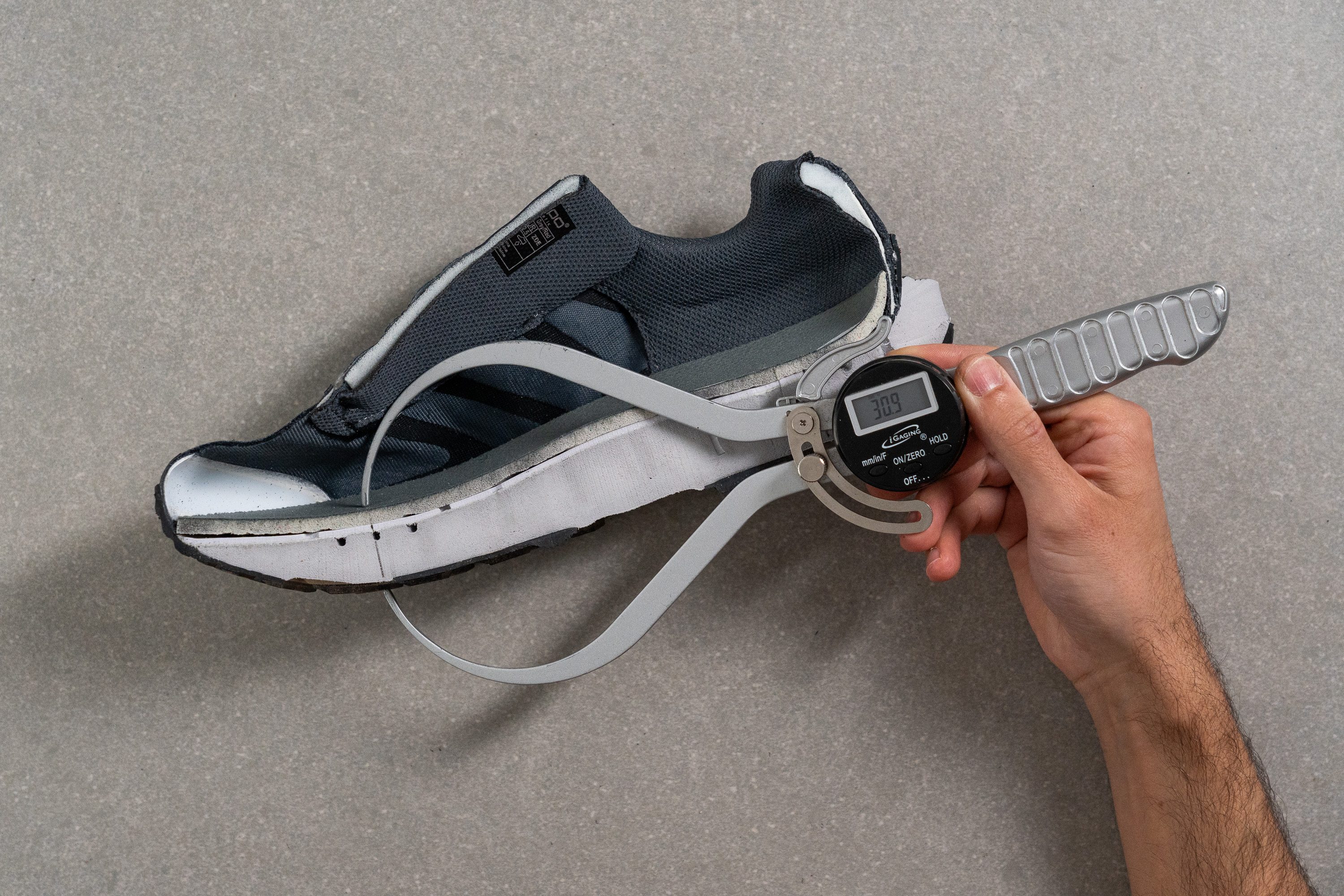
| Topo Ultraventure 3 | 30.9 mm |
| Average | 25.1 mm |
Drop
Topo is so committed to the 5-mm drop that they always showcase it somewhere on the shoe.
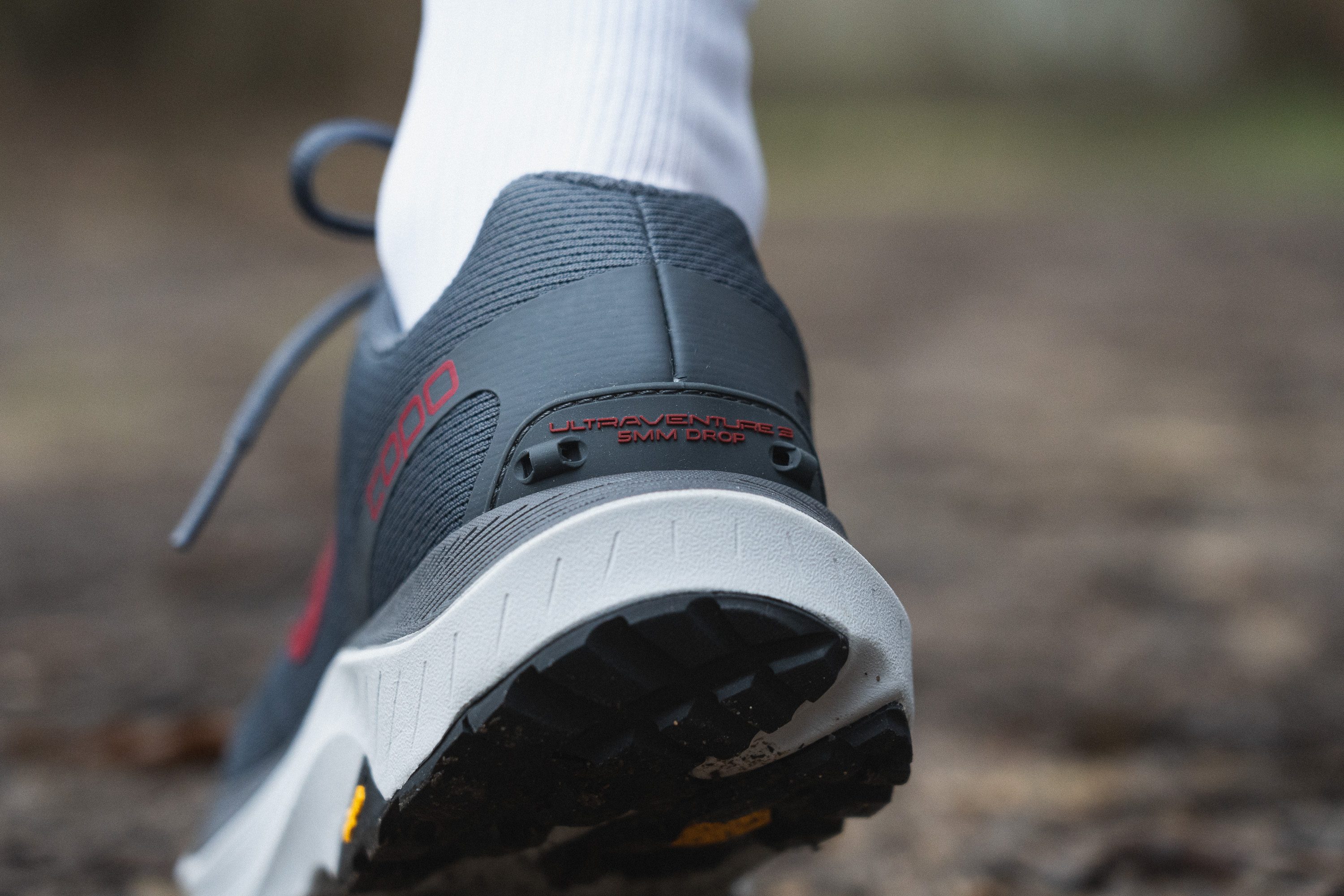
However, in our lab, we measured 6.3 mm—still a moderate offset that feels virtually the same and remains ideal for midfoot and forefoot strikers. And if you're wondering about those weird heel holes, they’re gaiter attachments for Topo’s custom fastening system.
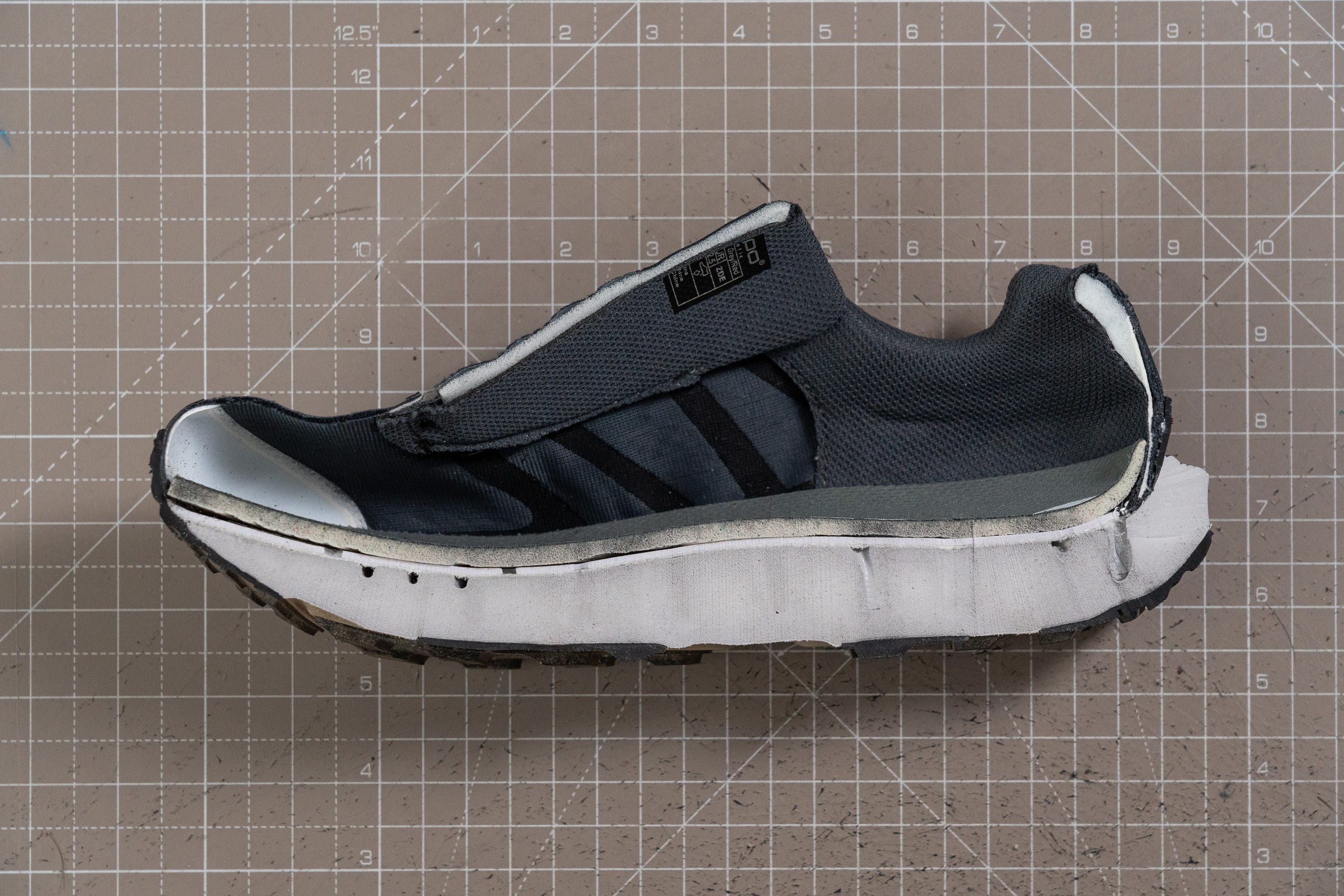
| Topo Ultraventure 3 | 6.3 mm |
| Average | 7.6 mm |
Midsole softness
This shoe is the trail-ready counterpart of the Topo Atmos, so we weren’t surprised to find the same ZipFoam midsole.
It's an EVA-based compound that delivers a good mix of durability, performance, and comfort—though runners expecting a super-soft or ultra-bouncy feel will need to look elsewhere. Instead, it provides a reliable, stable ride that aligns well with its price point.
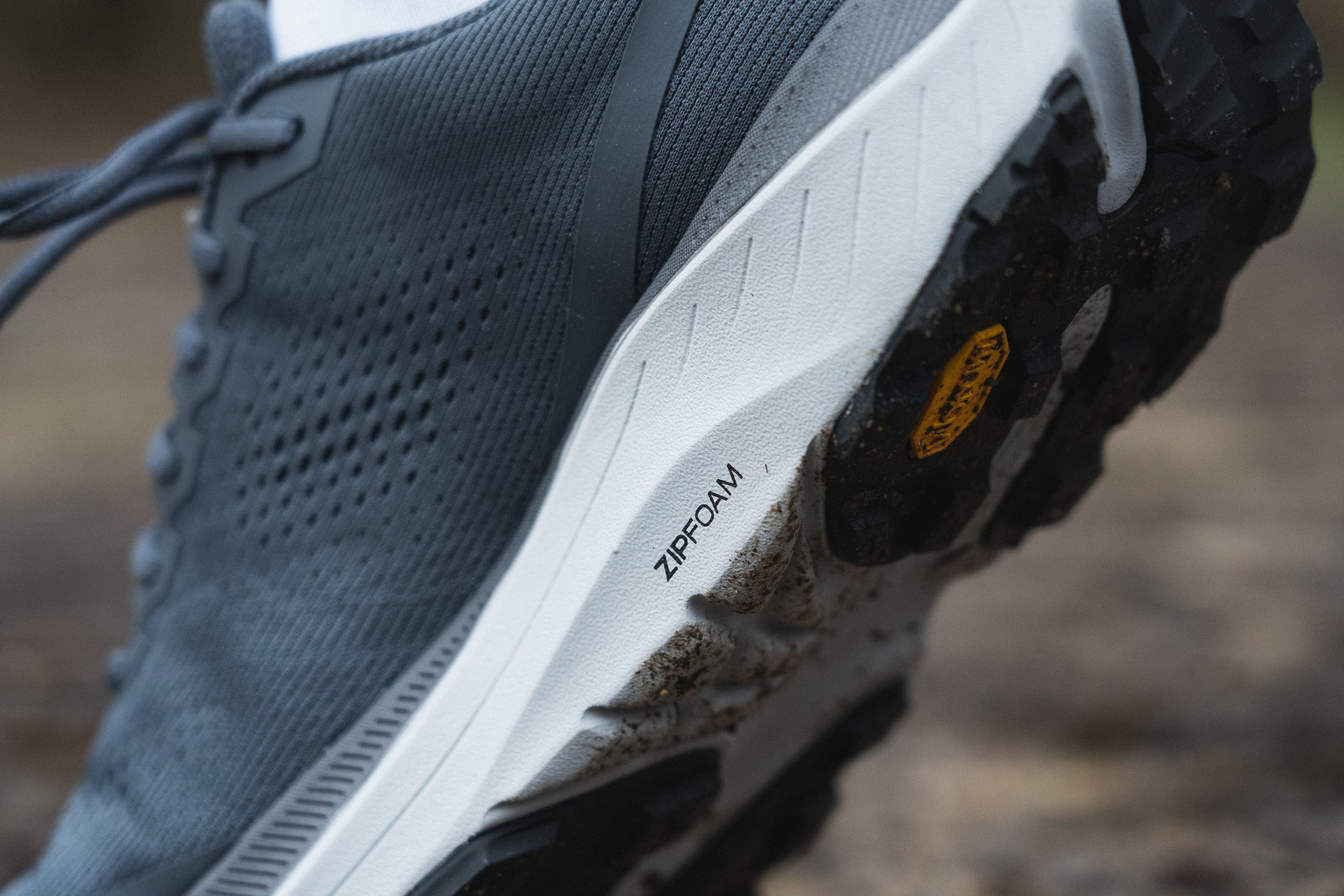
In terms of softness, our durometer measured 18.5 HA—just a touch softer than average. In our view, this makes it a solid choice for those seeking a cushioned-yet-stable experience.
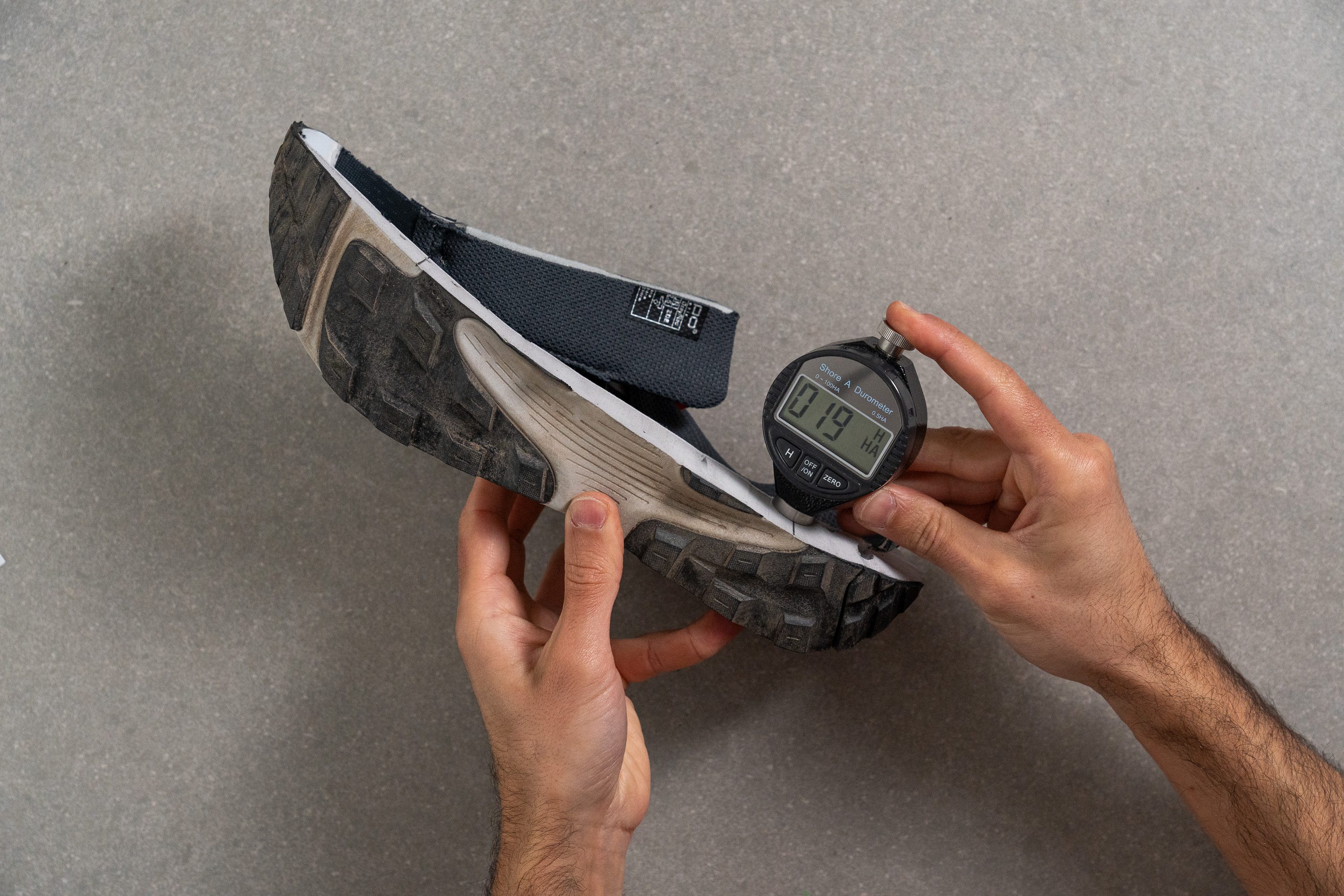
| Topo Ultraventure 3 | 18.5 HA |
| Average | 22.0 HA |
Rocker
The Topo Athletic Ultraventure 3 has a moderate toe spring that stays unobtrusive while walking or running, offering just enough curvature to balance its towering stack height.
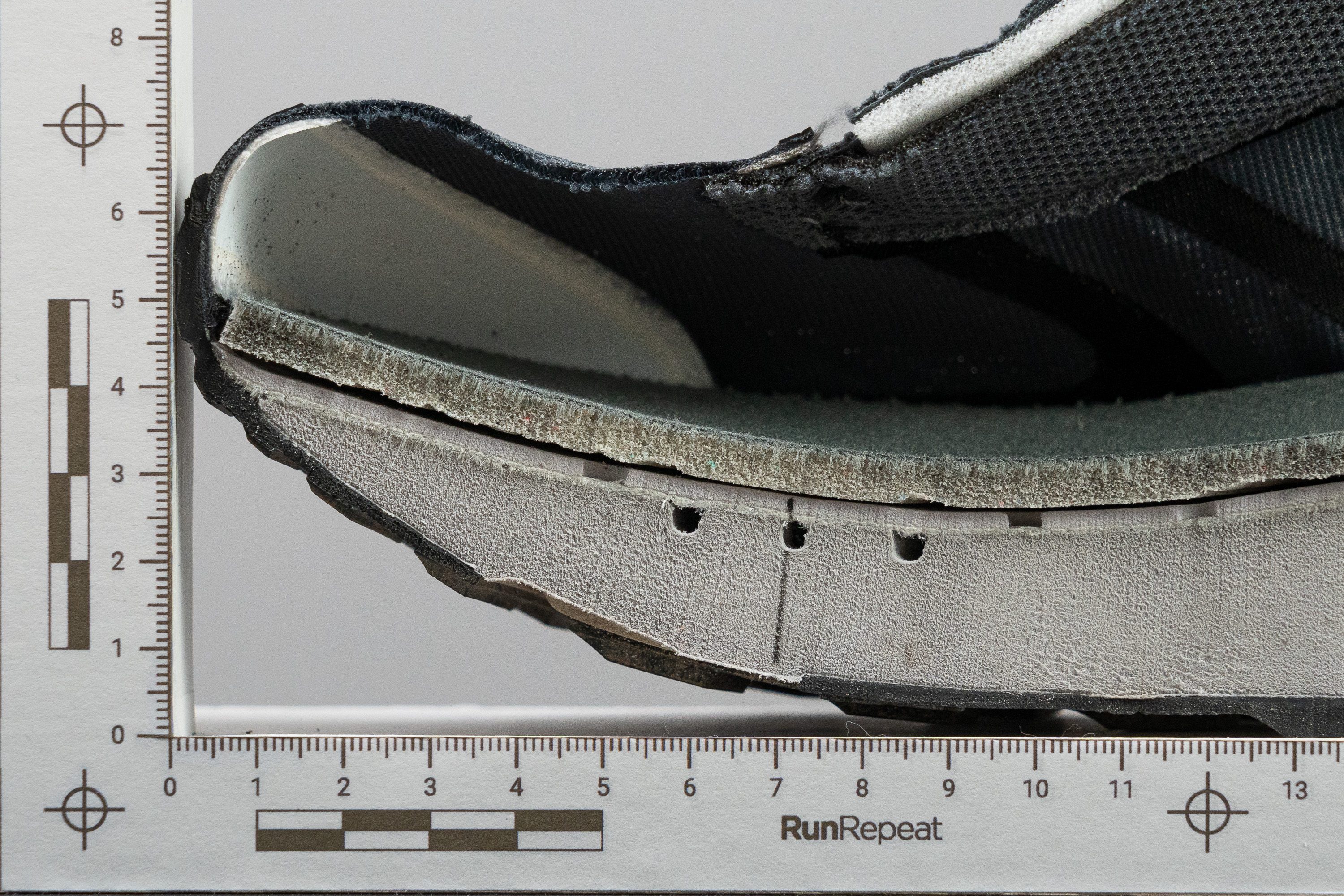
Size and fit
Size
Topo Ultraventure 3 fits true to size (53 votes).
Width / Fit
A signature feature of Topo shoes is their ultra-roomy, foot-shaped fit, and after creating a precise gel mold, we guarantee that the Ultraventure 3 stays true to this design.
Our measurement at the widest part came in at a spacious 99.9 mm—well above average.
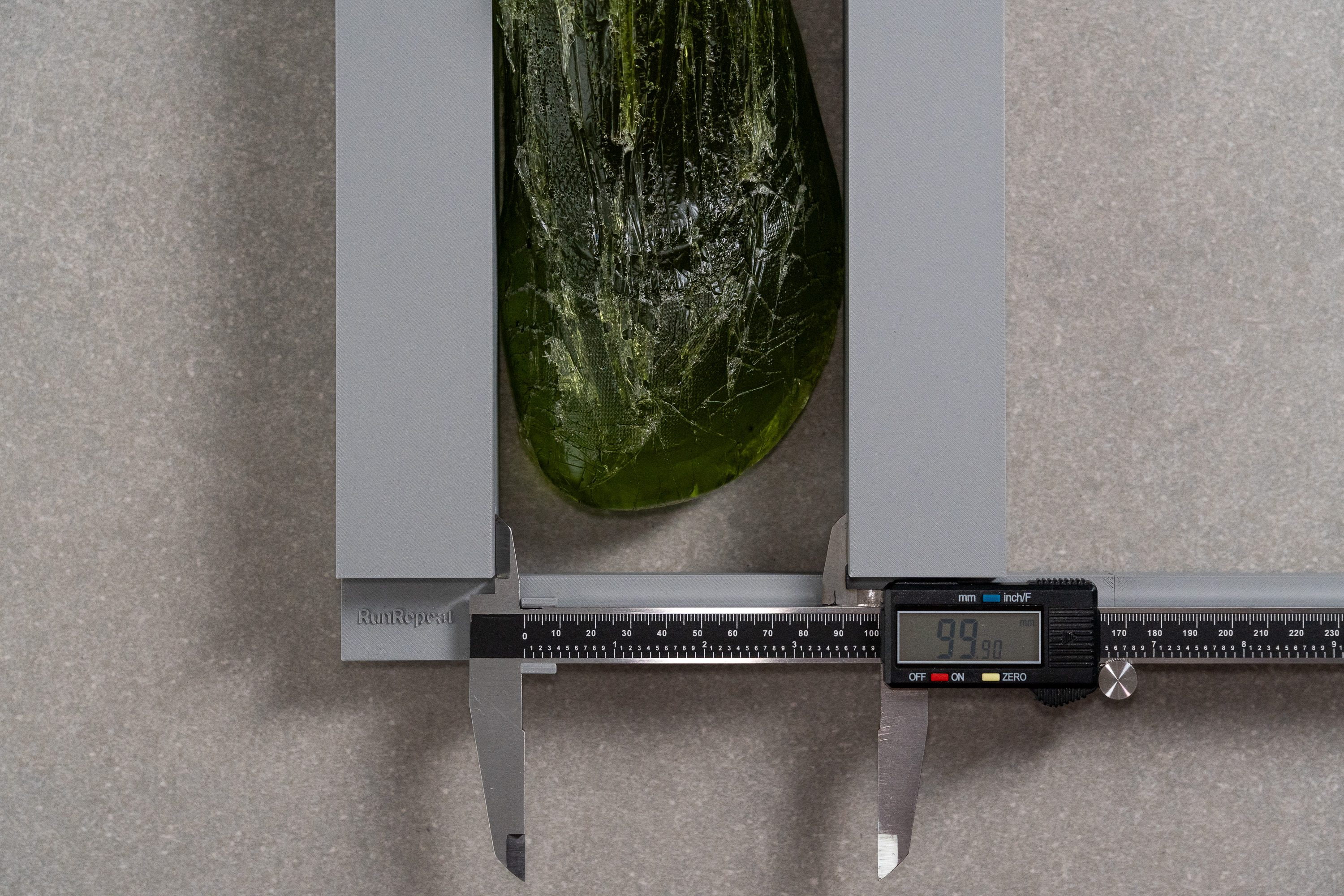
| Topo Ultraventure 3 | 99.9 mm |
| Average | 95.6 mm |
Toebox width
But it’s our second measurement that truly matters for those focused on toe splay, as we take it in the toe area. Here, we recorded an impressive 81.6 mm—exceptionally wide toebox and a clear sign that this shoe respects natural foot anatomy.
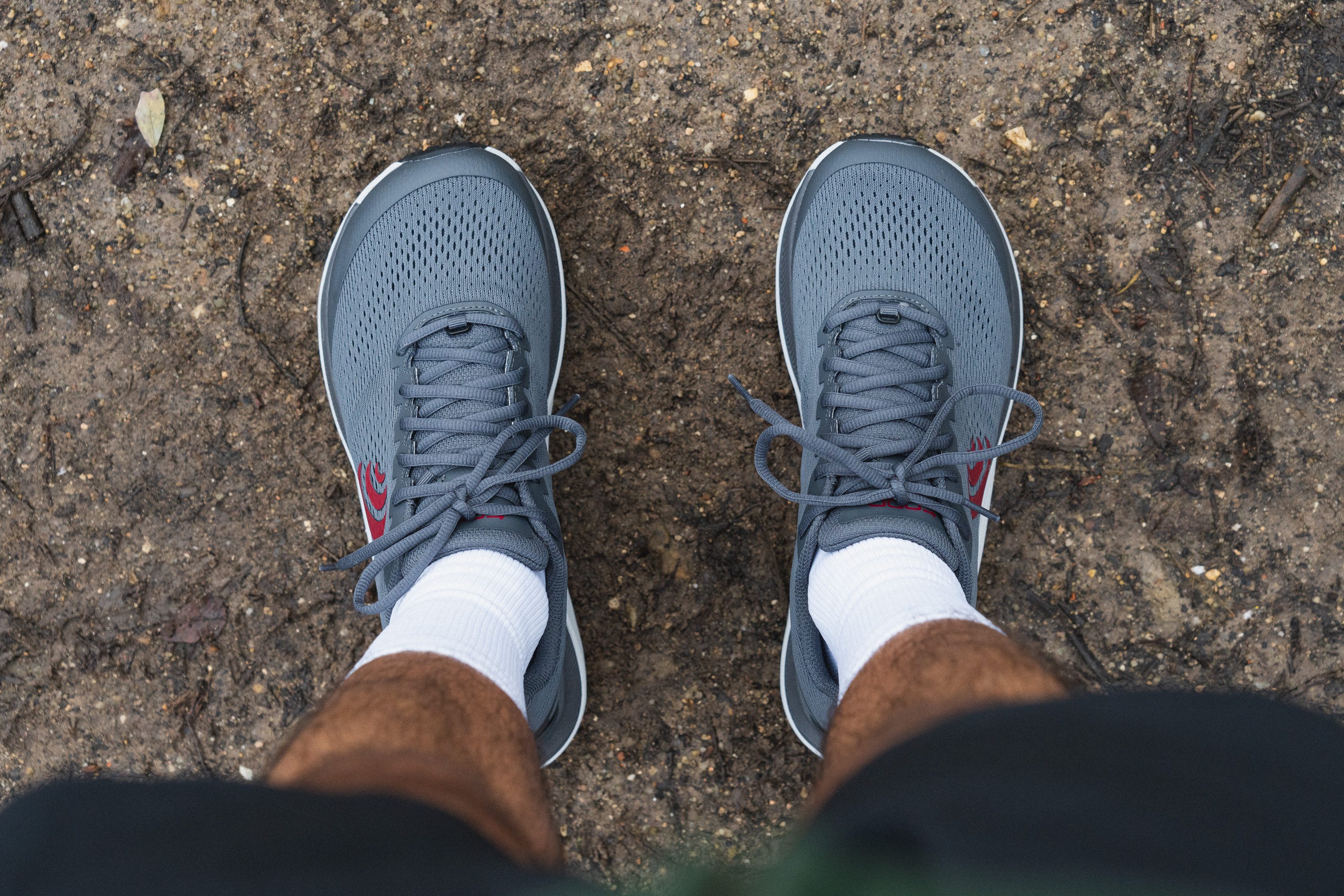
This ultra-spacious design makes it an outstanding choice for runners who prioritize unrestricted toe movement, though it may feel excessively roomy for those with narrow feet.
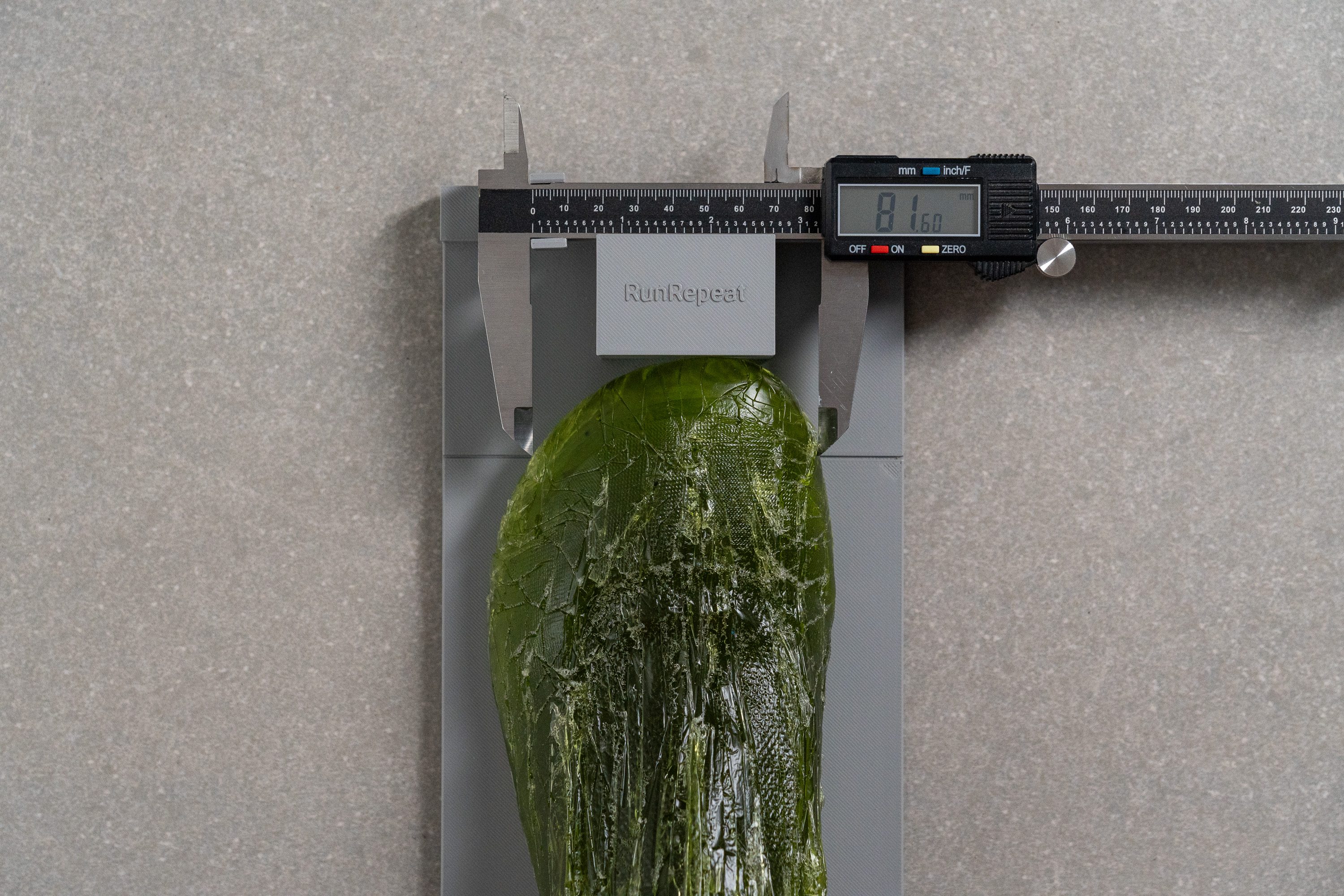
| Topo Ultraventure 3 | 81.6 mm |
| Average | 74.6 mm |
Toebox height
If the first two measurements caught your attention, this one is just as remarkable.
We measured a generous 31.3 mm of toebox height, and in our view, this makes it an outstanding option for runners with high-volume feet, providing superior space for upward movement.
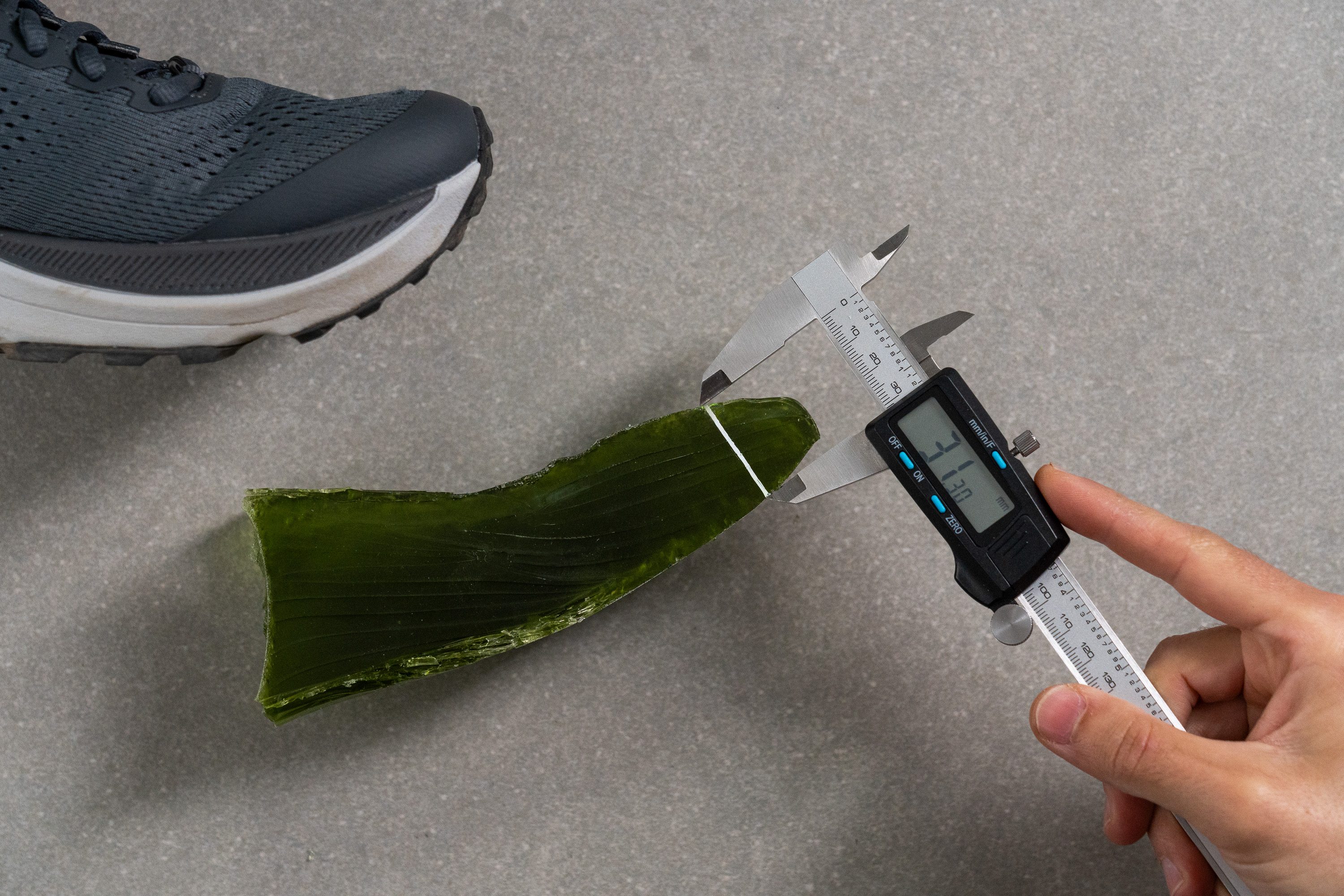
| Topo Ultraventure 3 | 31.3 mm |
| Average | 27.0 mm |
Traction / Grip
Lug depth
The rectangular, non-aggressive lugs are relatively shallow at 3.2 mm, and when combined with the extensive exposed midsole, they strongly suggest that Topo designed this shoe for easy terrain.
In our view, it fits the bill as a door-to-trail option—essentially a wide-foot-friendly alternative to the Nike Pegasus Trail 5.
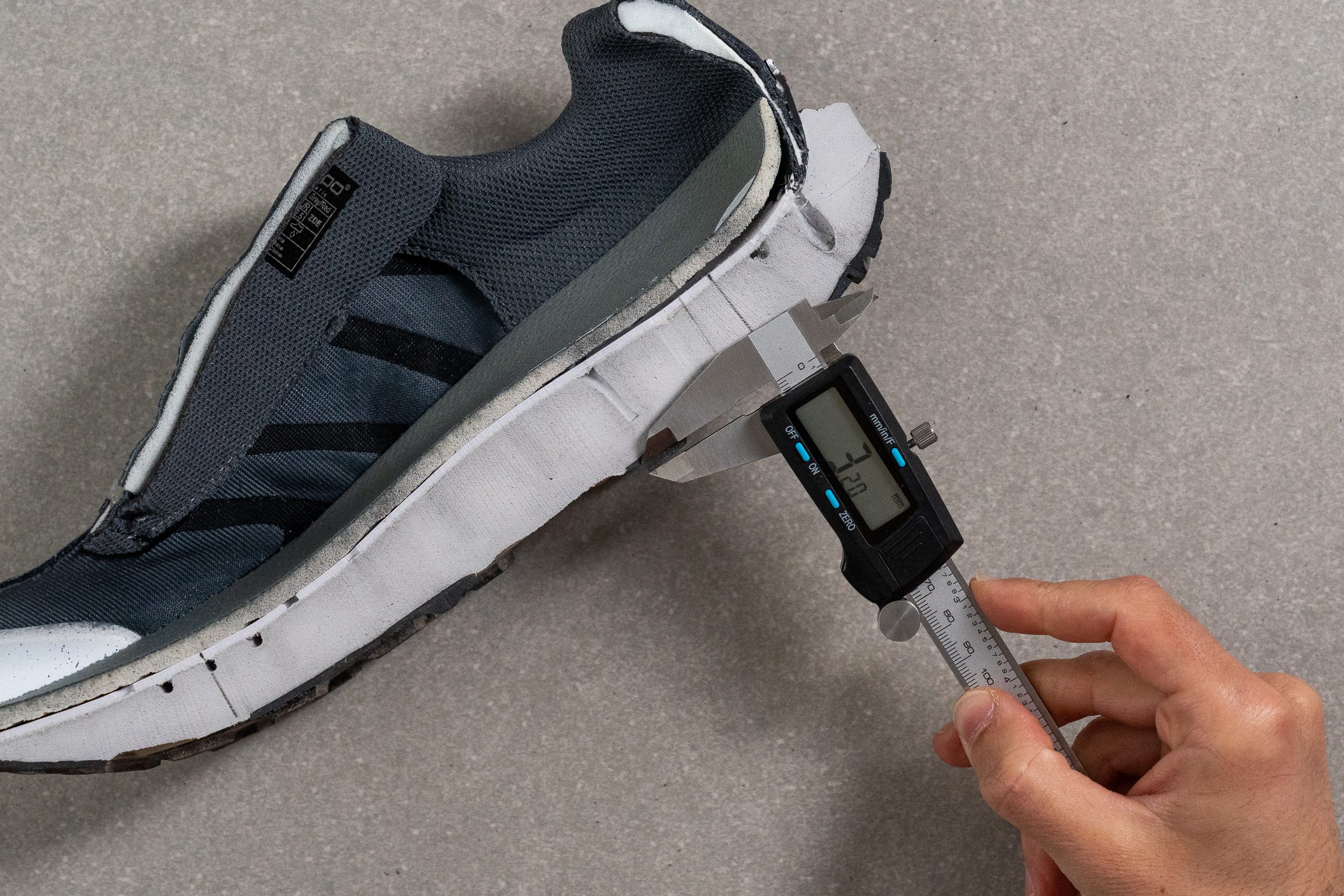
| Topo Ultraventure 3 | 3.2 mm |
| Average | 3.5 mm |
Outsole design
The Ultraventure 3 uses a segmented Vibram Megagrip outsole with partial rubber coverage, exposing large sections of the midsole. On the plus side, this minimalist approach helps shave off extra weight, making the design more streamlined.
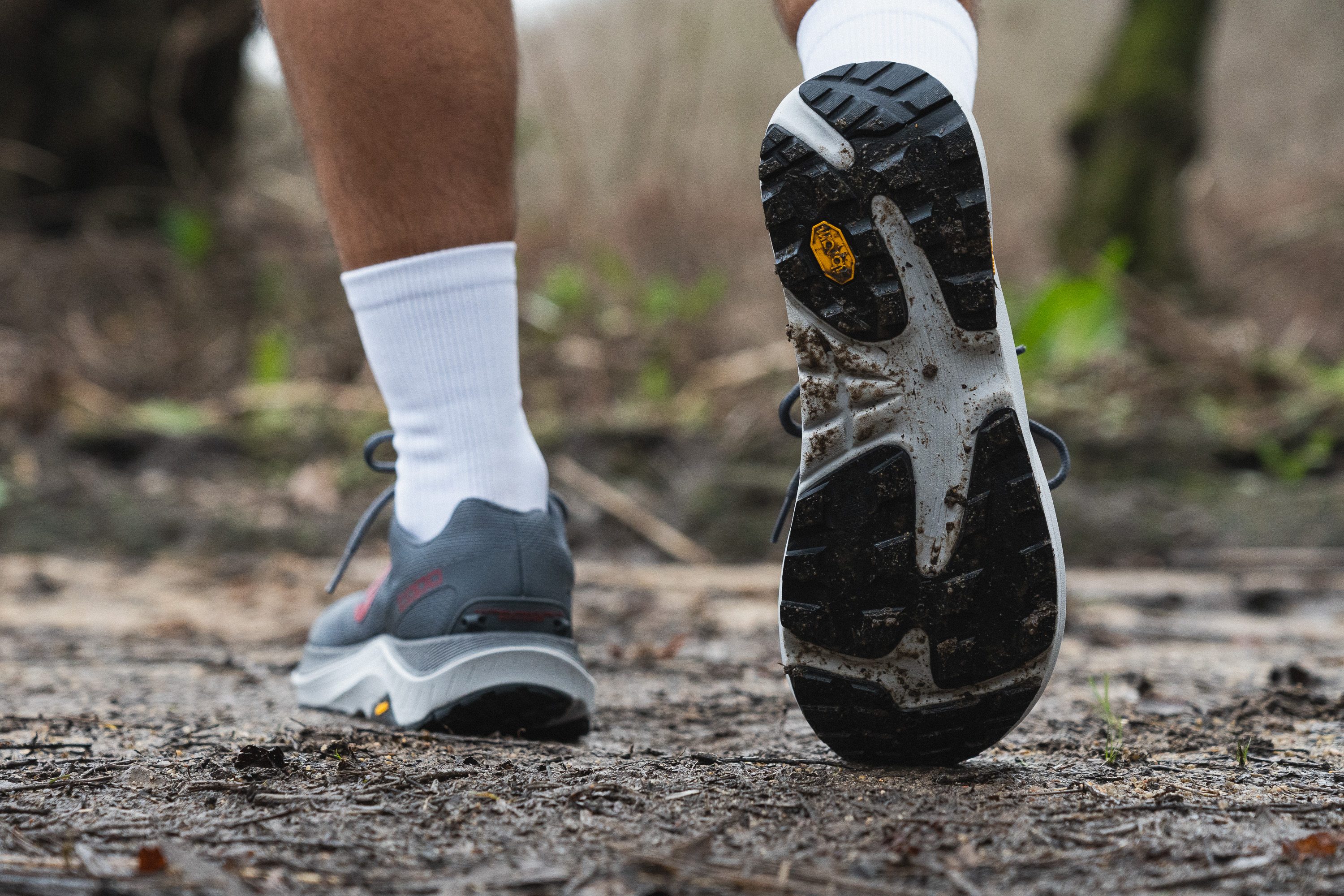
Flexibility / Stiffness
One of this shoe’s unique strengths is its impressive flexibility despite its ultra-cushioned, maximalist build. In our 30-degree bend test, we measured just 12.9N—a low result, making it a top pick for those seeking a natural-feeling yet highly-cushioned running or hiking experience.
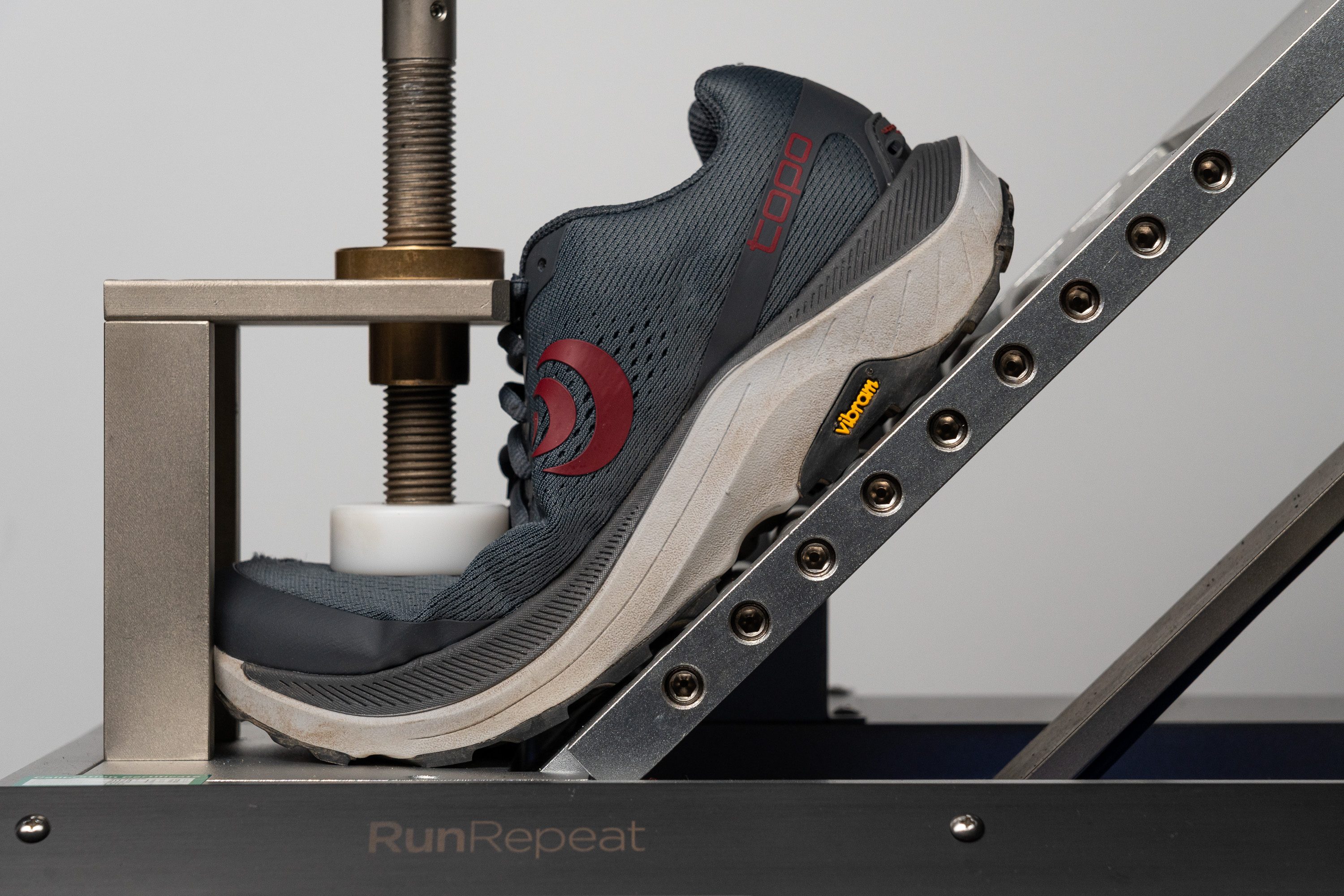
| Topo Ultraventure 3 | 12.9N |
| Average | 14.6N |
Weight
Another impressive and unexpected result from the Ultraventure 3 comes here.
Most trail shoes easily surpass the 10 oz mark, yet Topo Athletic kept this one at just 9.75 oz (276g), an outstanding achievement for a shoe exceeding 30 mm in both heel and forefoot.
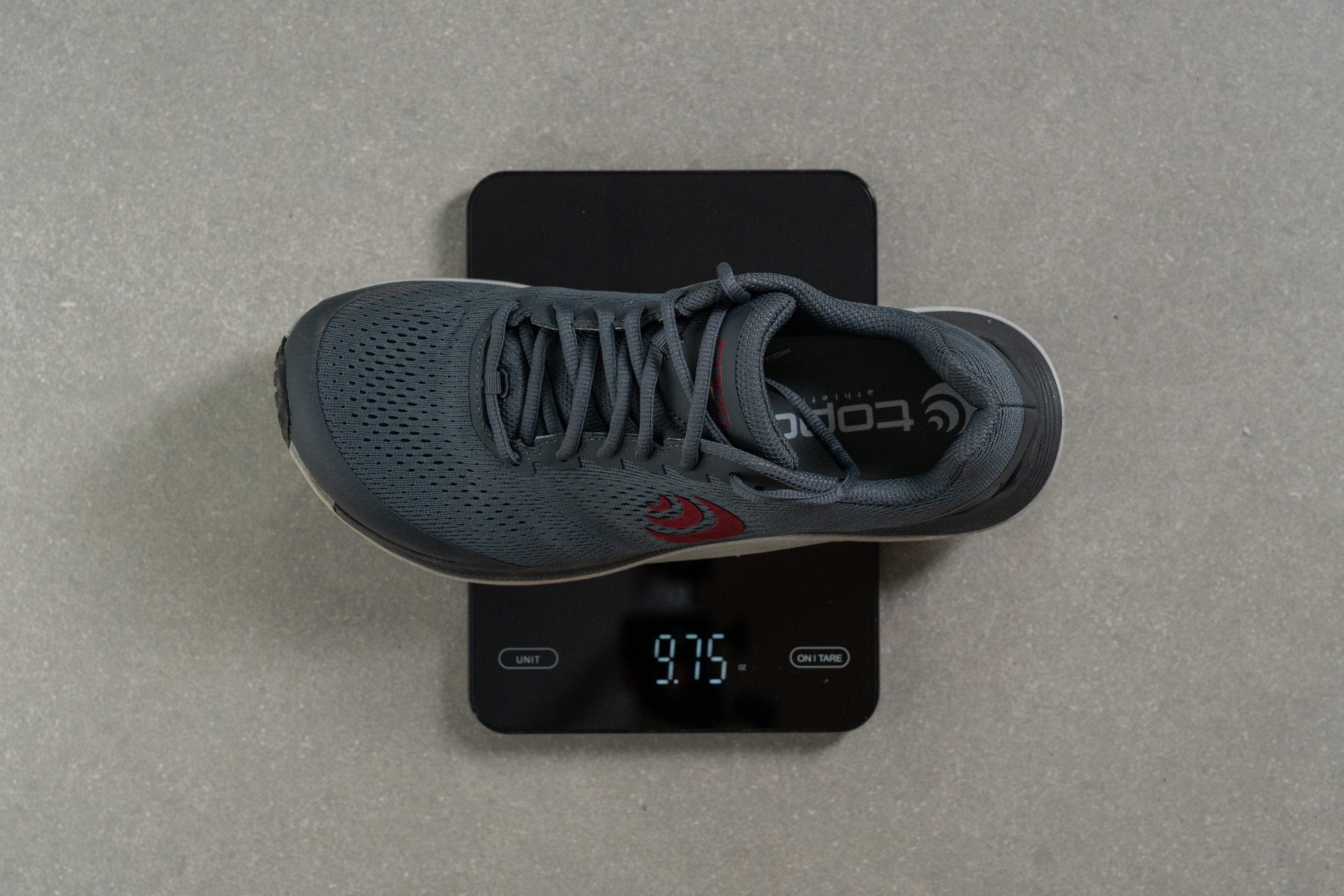
| Topo Ultraventure 3 | 9.7 oz (276g) |
| Average | 10.2 oz (289g) |
Breathability
Upon unboxing the Ultraventure 3, we immediately noticed its ventilation holes and a material that felt strikingly similar to those of road shoes. However, after testing it with our smoke machine, we found that while airflow was decent, it wasn’t exceptional—likely due to the reinforced overlays and multi-layer construction.
Unlike most shoes, which emphasize airflow primarily in the toebox, the Ultraventure 3 provides similar breathability in both the forefoot and midfoot. This is a rare design choice, and in our experience, it’s great news for runners who struggle with arch blisters or hotspots.
Under the microscope, we discovered a straightforward two-layer engineered mesh without any unusual elements. The material is what we typically see in daily trainers—designed to balance durability and breathability rather than maximize airflow.
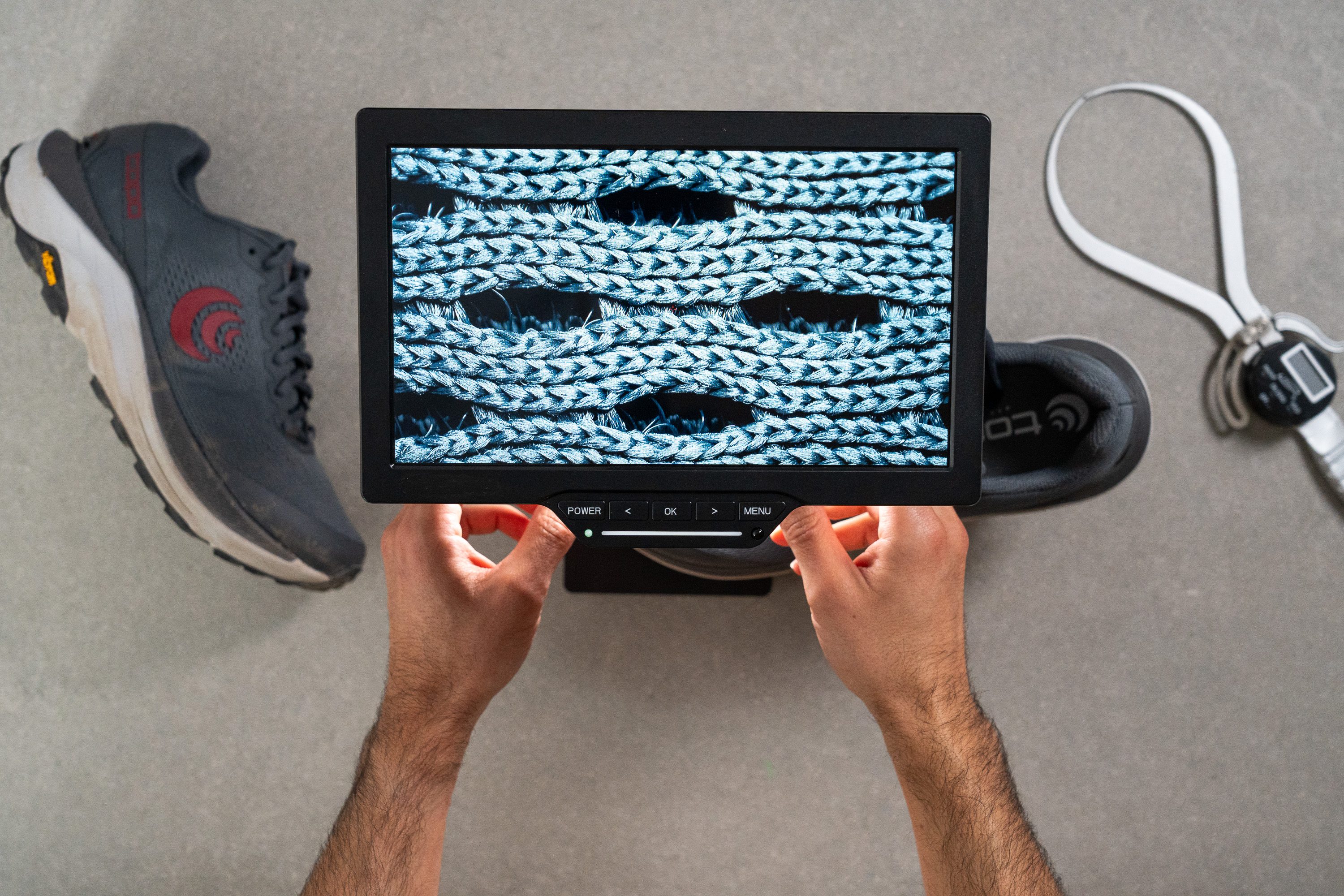
We rated its breathability at 3/5, which aligns with most trail-focused models. The lack of excessive padding helps prevent overheating, but the reinforced upper does limit airflow compared to more minimal designs.
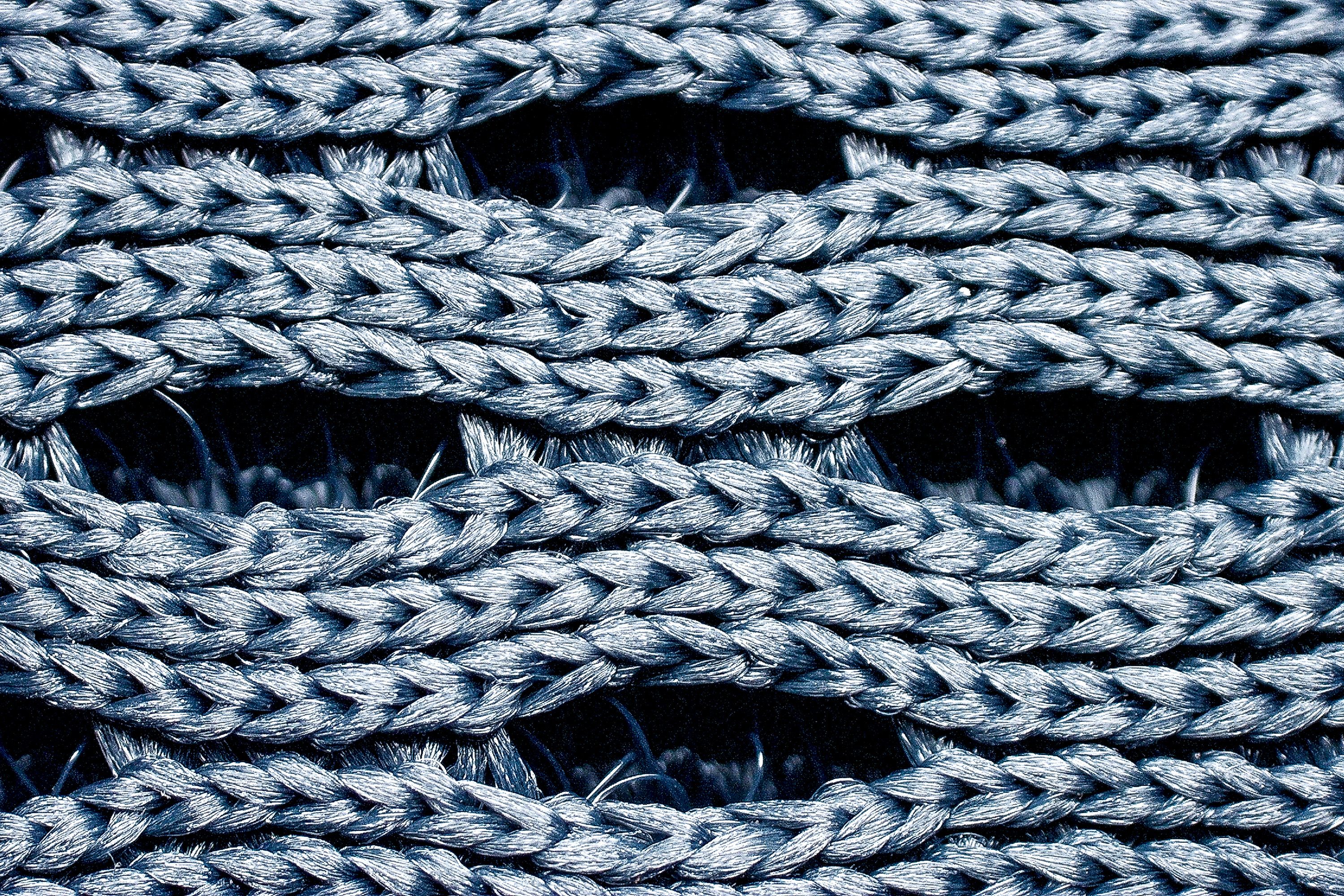
Overall, while the upper is well-built and free from glue marks or imperfections, it isn’t a standout feature of this shoe. It delivers reliable performance, but those seeking maximum ventilation for trail running may want to explore alternatives that scored 4 or 5 in our test.
| Topo Ultraventure 3 | 3 |
| Average | 3.3 |
Stability
Lateral stability test
During our runs with the Topo Ultraventure 3, stability felt quite good in the midfoot and forefoot, thanks to its generously-wide landing platform. The heel, however, is slightly less stable due to its dimensions and lack of sidewalls, though for neutral runners, it’s hardly a concern.
Torsional rigidity
Like most trail shoes, the Ultraventure 3 has a high torsional rigidity of 4/5. This didn’t surprise us in the lab, as trail models typically feature more rubber for enhanced traction and protection compared to road running shoes.
| Topo Ultraventure 3 | 4 |
| Average | 3.6 |
Heel counter stiffness
The heel counter offers a moderately flexible feel at 3 out of 5, similar to most running shoes, balancing stability and comfort effectively. We wouldn’t change a thing, though extreme heel strikers might have preferred a slightly stiffer design for added support.
| Topo Ultraventure 3 | 3 |
| Average | 3 |
Midsole width - forefoot
In our experience, the Ultraventure's broad forefoot is the key to its stability in the front section of the shoe. We measured 117.3 mm with our calipers—a generous base that supports steady landings, even when picking up the pace, though speed isn’t the strongest of this shoe.
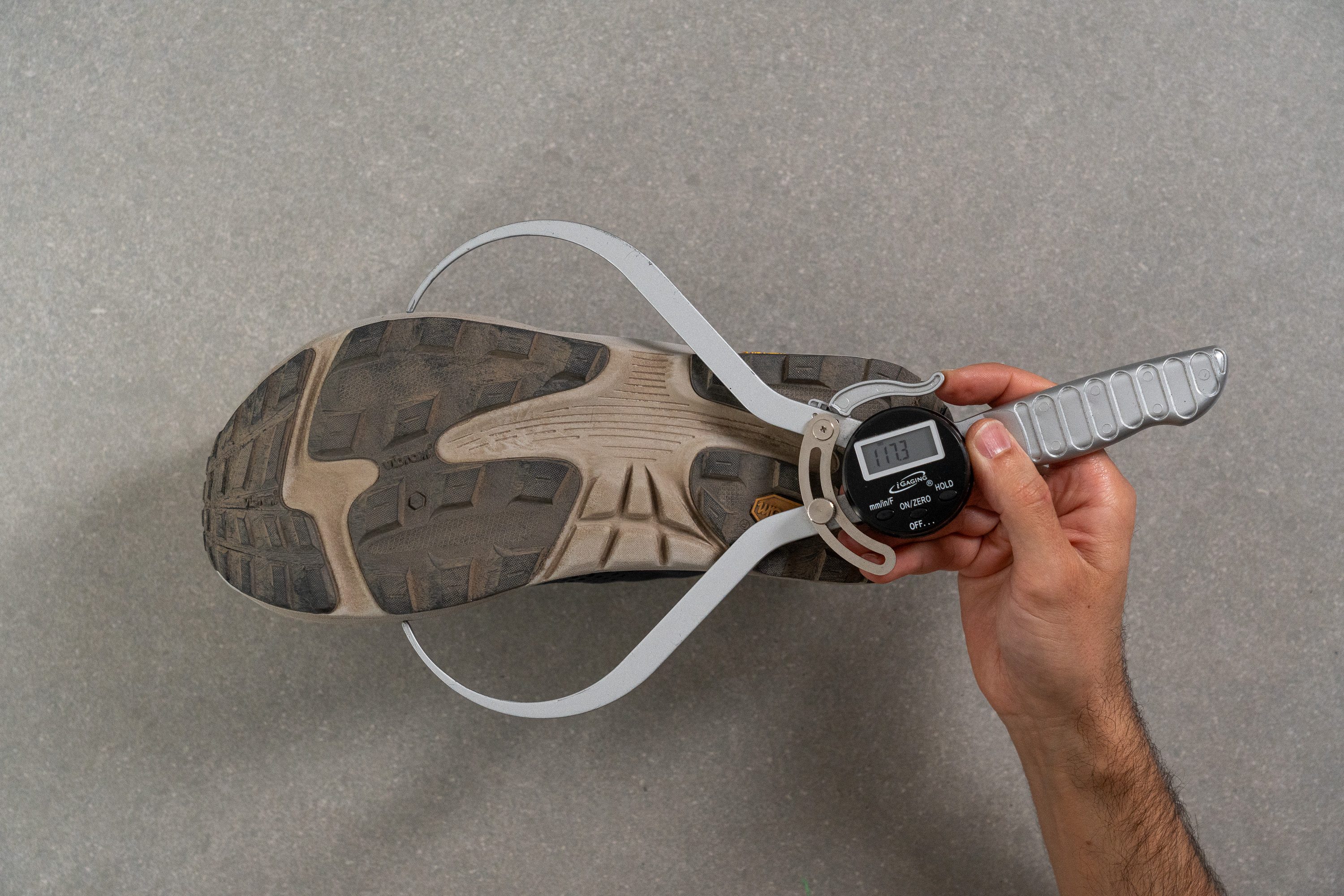
| Topo Ultraventure 3 | 117.3 mm |
| Average | 112.8 mm |
Midsole width - heel
The heel feels less stable at 88.2 mm, as we noted earlier in our lab review, but we can’t fault Topo. This shoe is designed for midfoot or forefoot strikers, featuring a moderate drop that complements its intended running style.
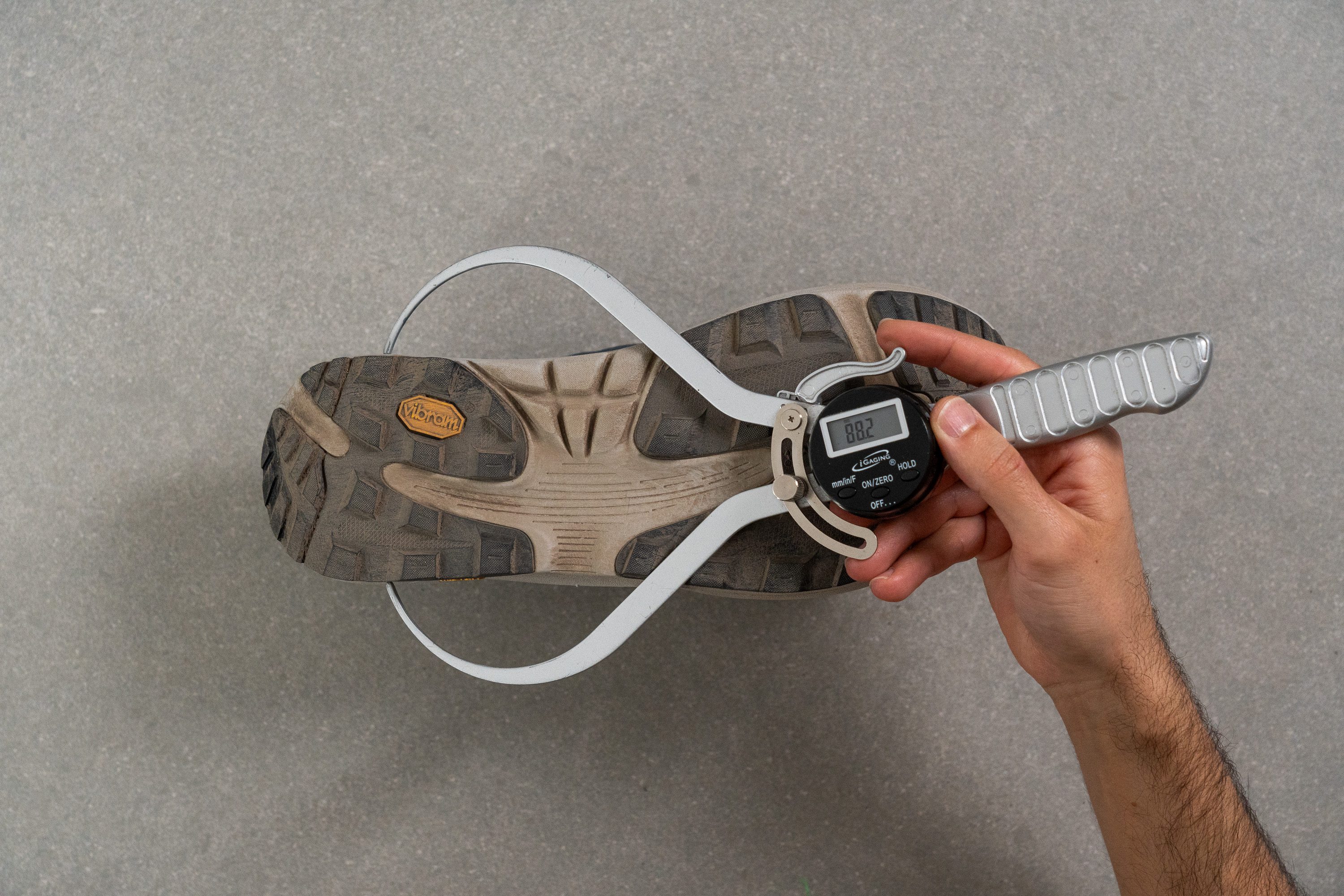
| Topo Ultraventure 3 | 88.2 mm |
| Average | 89.9 mm |
Durability
Toebox durability
The strategically placed ventilation holes somewhat enhance airflow, but in our experience here in the lab, they also make the upper more susceptible to wear. To gauge its resilience, we put the Ultraventure 3 through our usual Dremel test.
We discovered that while the upper held up reasonably well with a respectable 3/5 rating—fair for a trail shoe!
| Topo Ultraventure 3 | 3 |
| Average | 3.1 |
Heel padding durability
On the flip side, the heel counter fell short, scoring just 2/5. This could be a concern for runners who frequently experience wear in this area due to friction from the Achilles tendon.
| Topo Ultraventure 3 | 2 |
| Average | 3 |
Outsole durability
We put the outsole to the test with our high-speed Dremel. After 18 seconds, we discovered that it only produced a minimal 0.5-mm indentation in the Vibram rubber—an impressive outcome that easily surpasses the durability of the average trail shoe.
| Topo Ultraventure 3 | 0.5 mm |
| Average | 0.9 mm |
Outsole thickness
Topo opted for an average outsole thickness, measuring 2.2 mm—nothing unusual here.
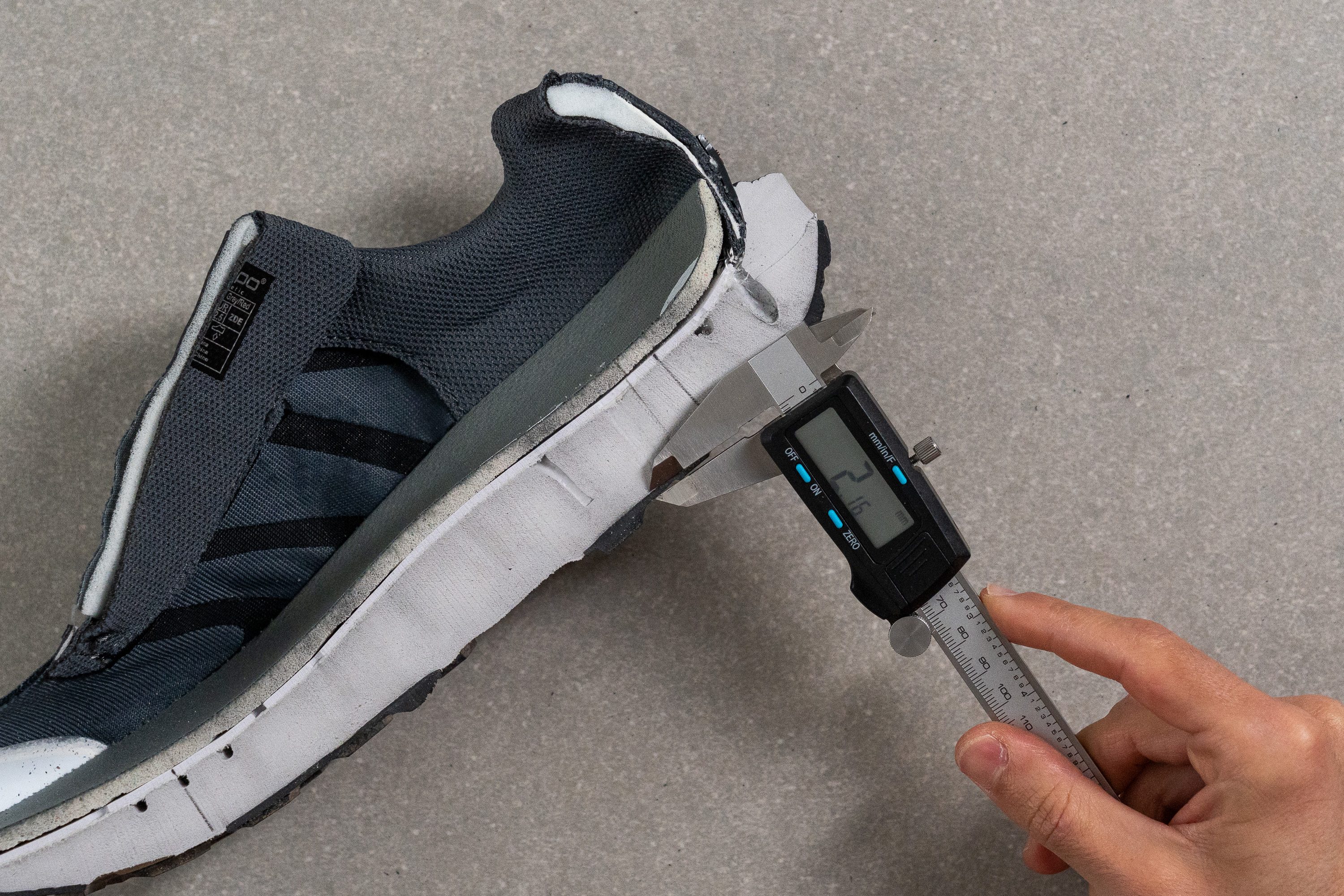
| Topo Ultraventure 3 | 2.2 mm |
| Average | 2.2 mm |
Misc
Insole thickness
Topo teamed up with Ortholite to deliver a higher-quality insole than usual, though its 4.5 mm thickness remains in the average range.
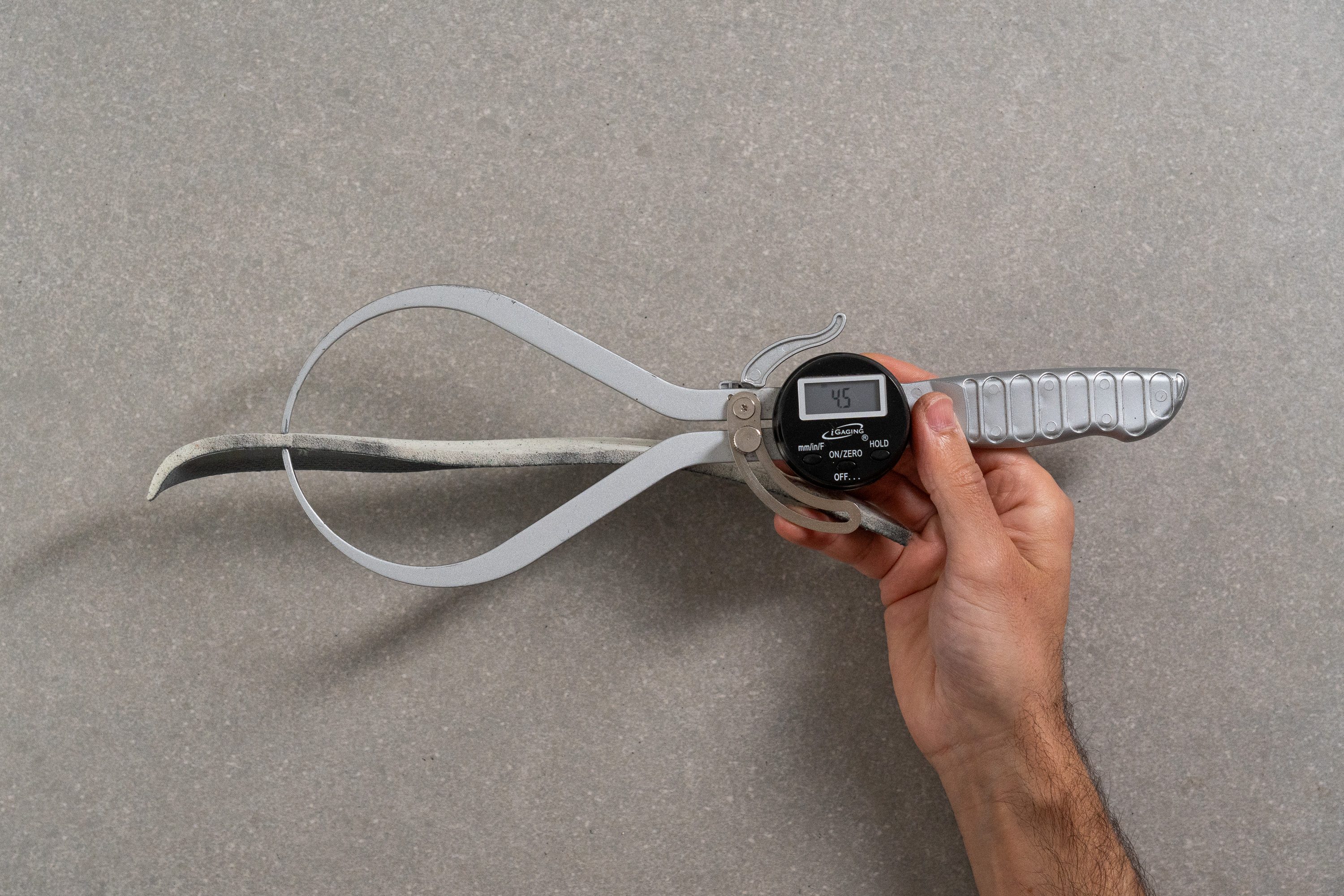
| Topo Ultraventure 3 | 4.5 mm |
| Average | 4.7 mm |
Removable insole
If you plan to swap in custom orthotics, there’s no issue, but they might feel a bit loose due to the Ultraventure 3’s generously spacious toebox. And you'll miss the enhanced energy return of the included Ortholite footbed.
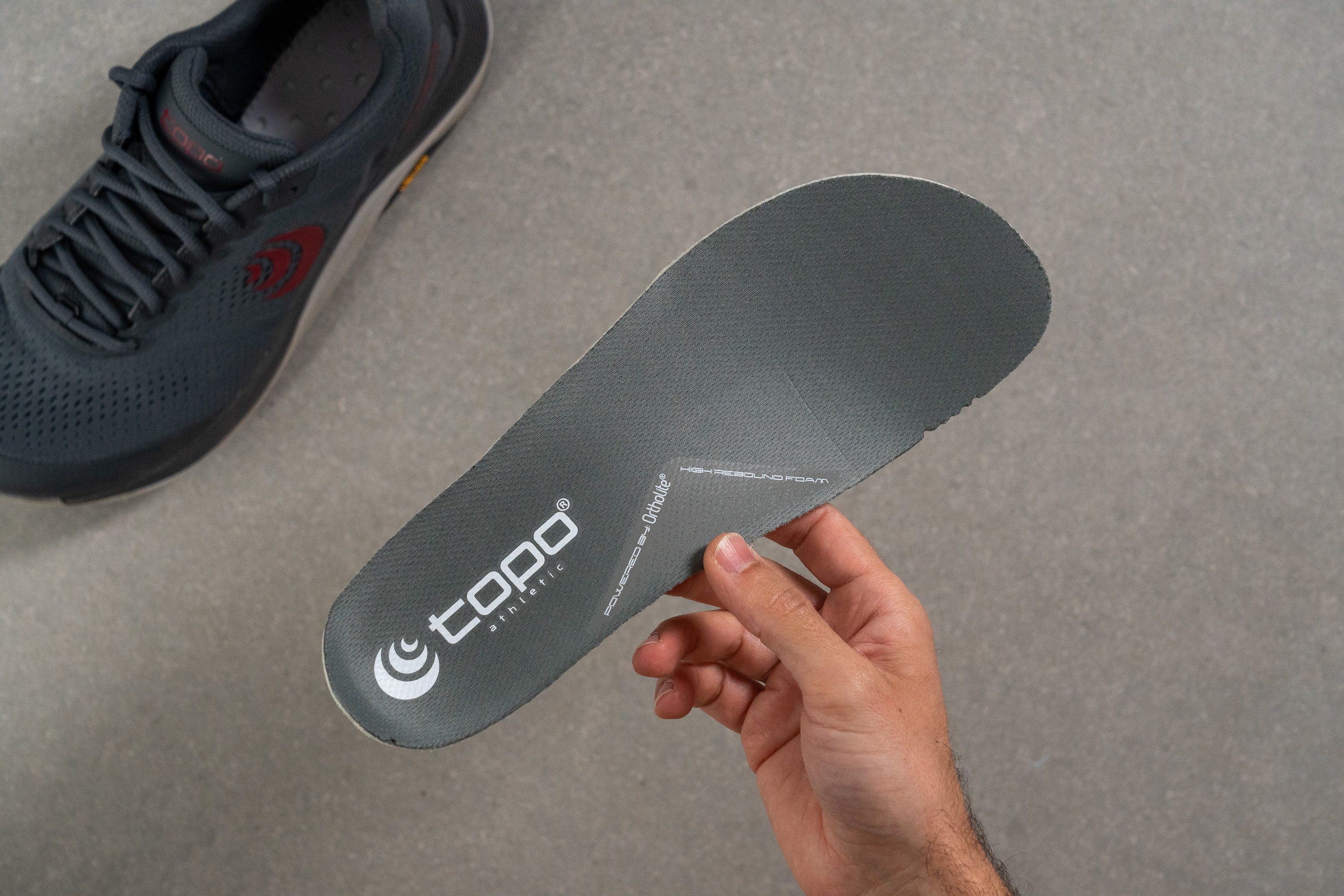
| Topo Ultraventure 3 | Yes |
Midsole softness in cold (%)
We discovered that this EVA-based foam performed really well in cold conditions, firming up by just 16% after 20 minutes in the freezer. That’s a standout result, especially for a midsole likely to face chilly adventures.
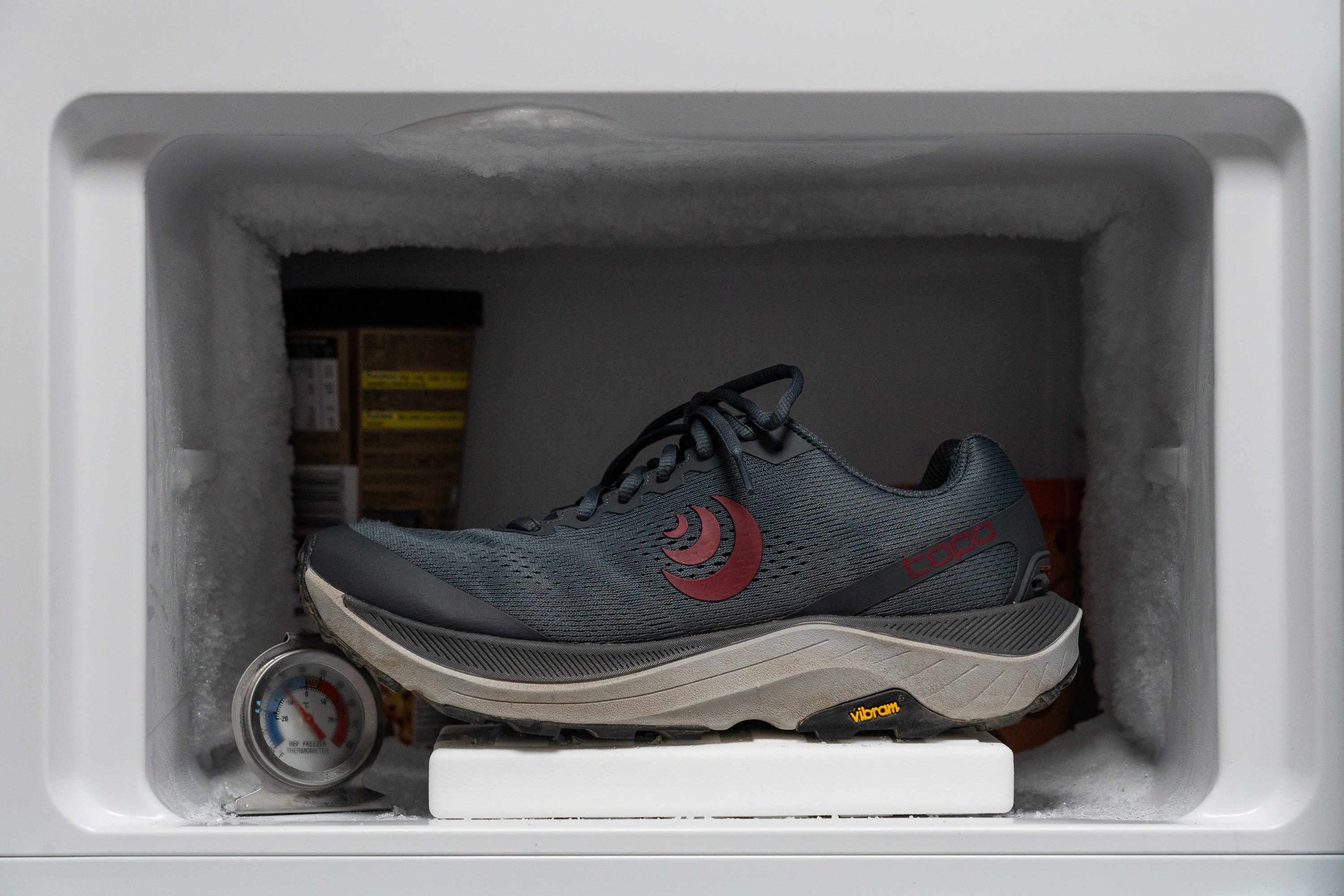
| Topo Ultraventure 3 | 16% |
| Average | 26% |
Reflective elements
One area where Topo could enhance the Ultraventure 4 is by adding reflective elements for better visibility in low-light conditions.
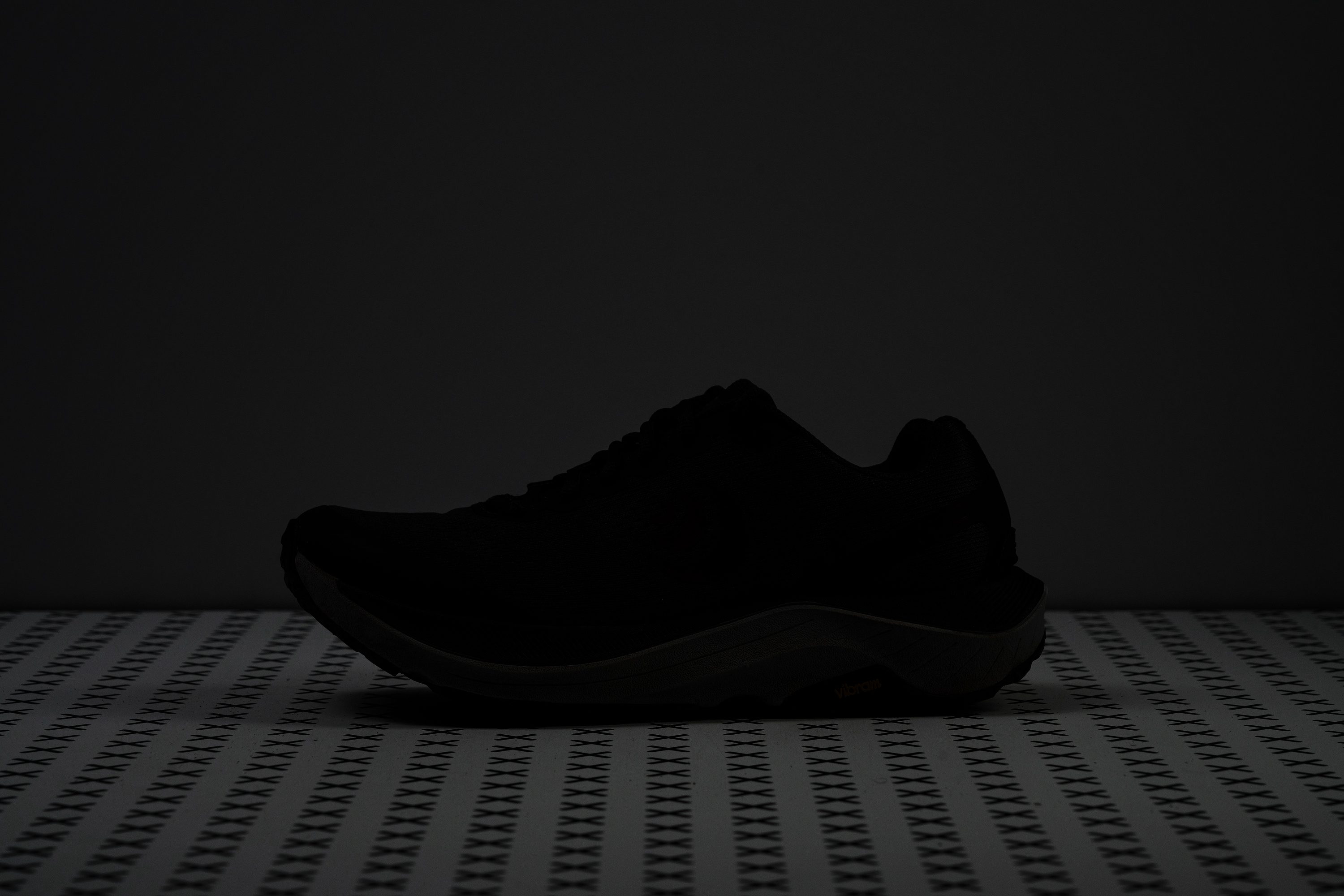
| Topo Ultraventure 3 | No |
Tongue padding
The tongue boasts 5.8 mm of padding—an excellent balance between weight and comfort, perfectly aligning with this shoe main strength. And we never felt a lack of comfort!
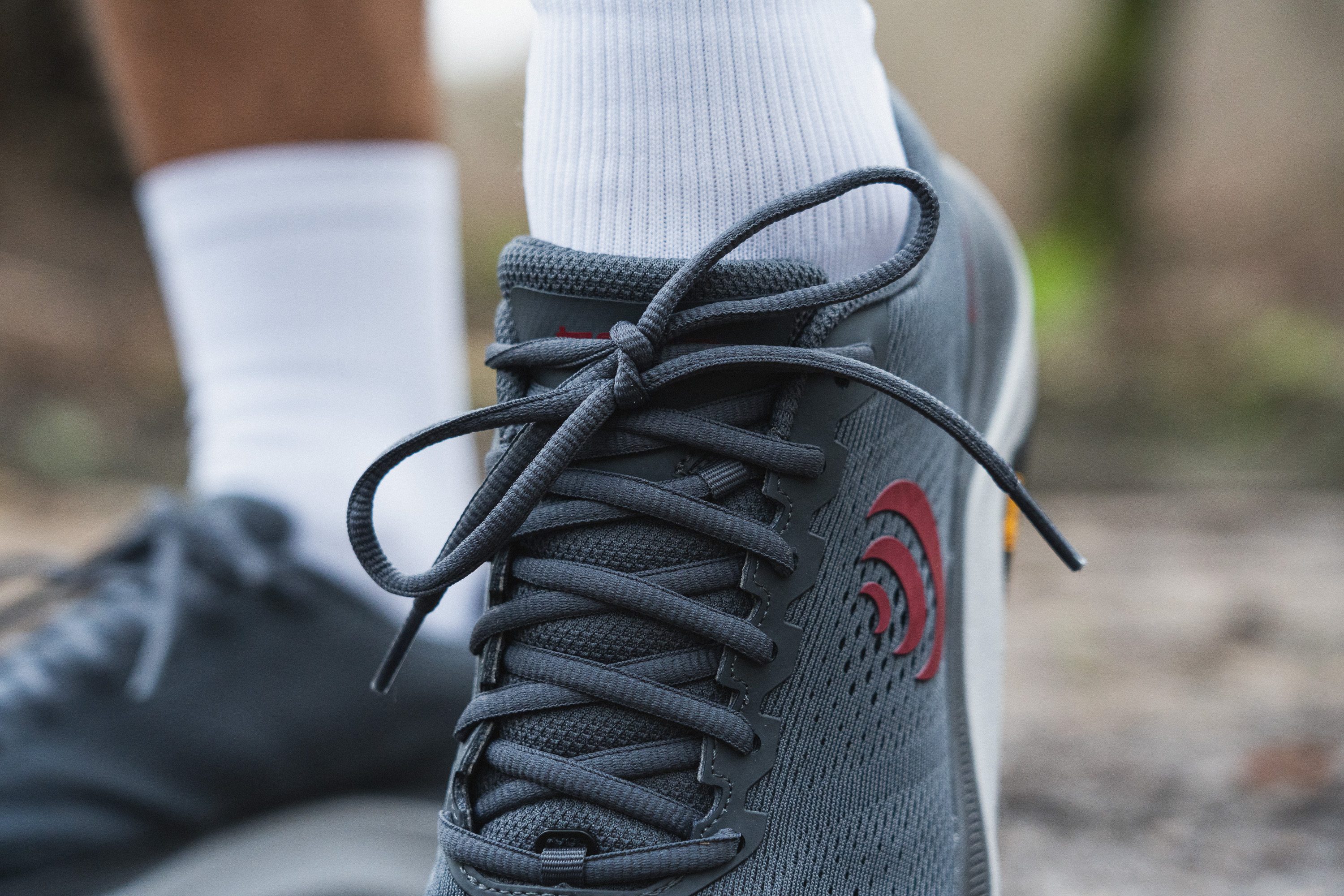
The laces, however, could use a more rugged design to match the trail aesthetic, as they're just those of a standard road running shoe. That said, they function well, and swapping them is always an option.
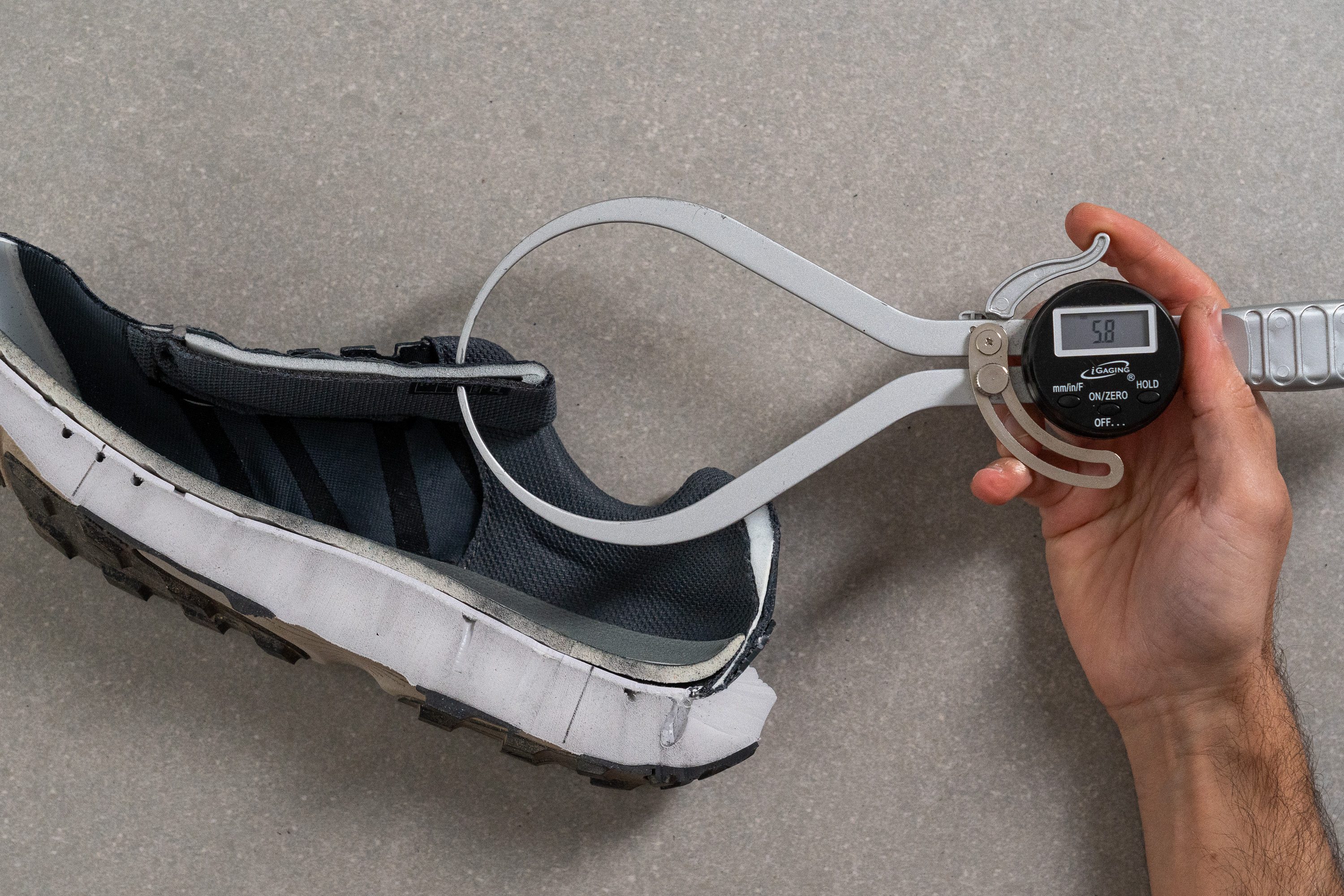
| Topo Ultraventure 3 | 5.8 mm |
| Average | 6.4 mm |
Tongue: gusset type
We were surprised to find the tongue securely fixed to the sides, unlike Topo’s road models like the Phantom 3, which features a non-gusseted design. However, for a trail shoe, this is almost essential, preventing debris entry—and we’re happy to report that Topo ticked this box.

| Topo Ultraventure 3 | Both sides (semi) |
Heel tab
Most trail shoes include a finger-loop heel tab for both aesthetics and practicality, but it looks like Topo’s designers had a different approach!
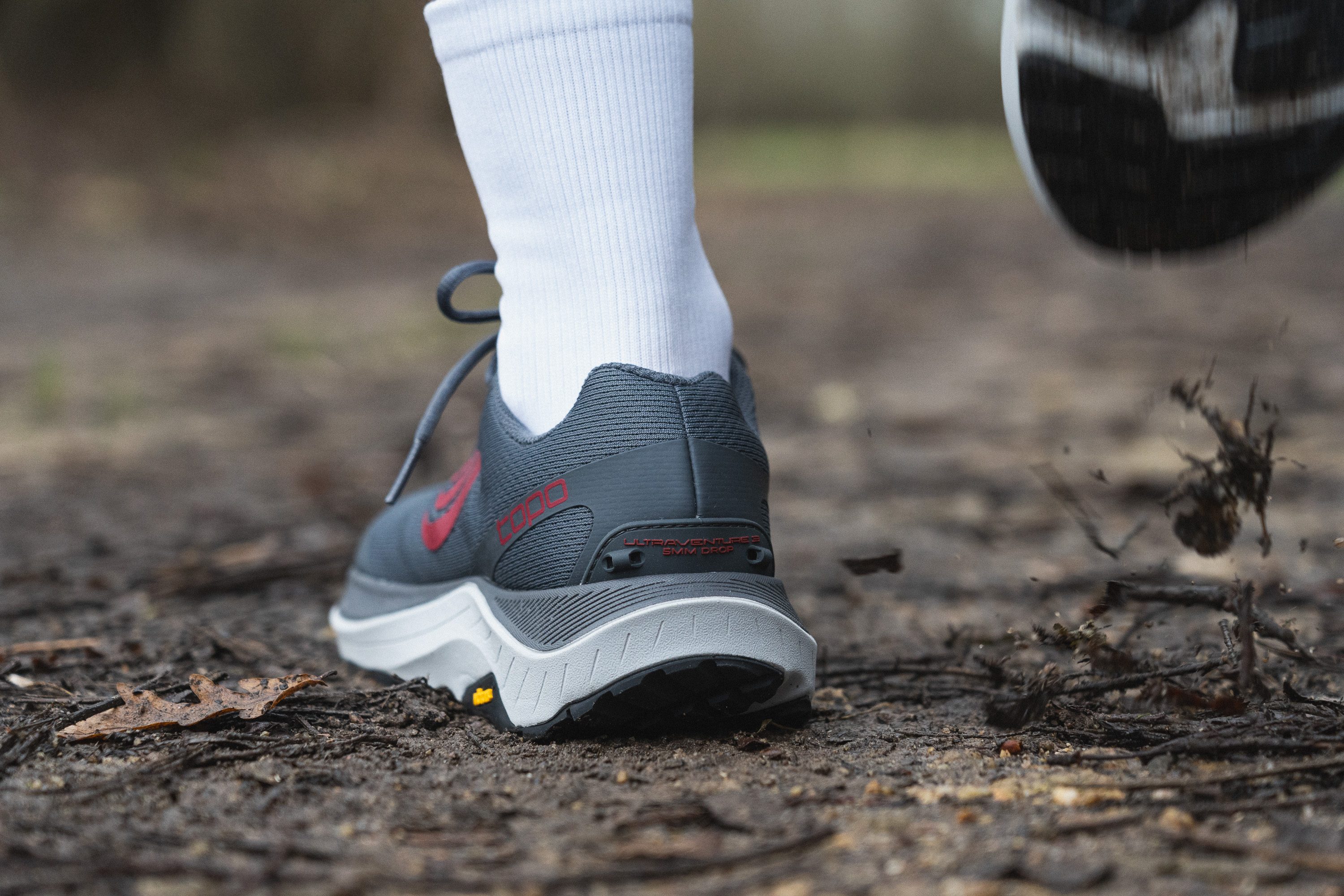
| Topo Ultraventure 3 | None |
Price
We think the Ultraventure 3 is fairly priced, offering a decent foam, a world-class Vibram outsole, and solid build quality.
| Topo Ultraventure 3 | $150 |
| Average | $153 |

